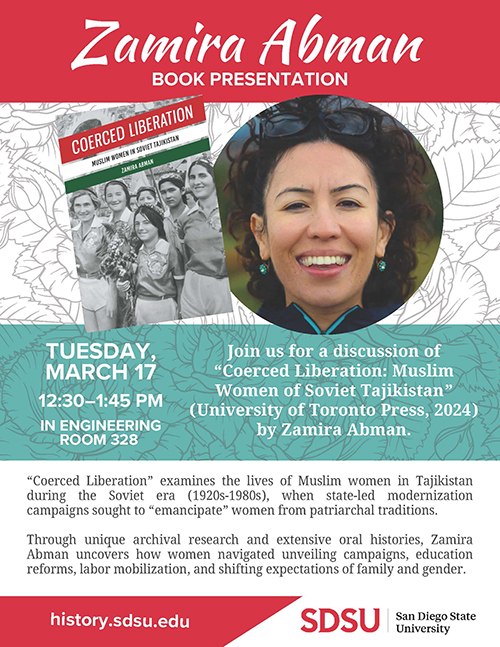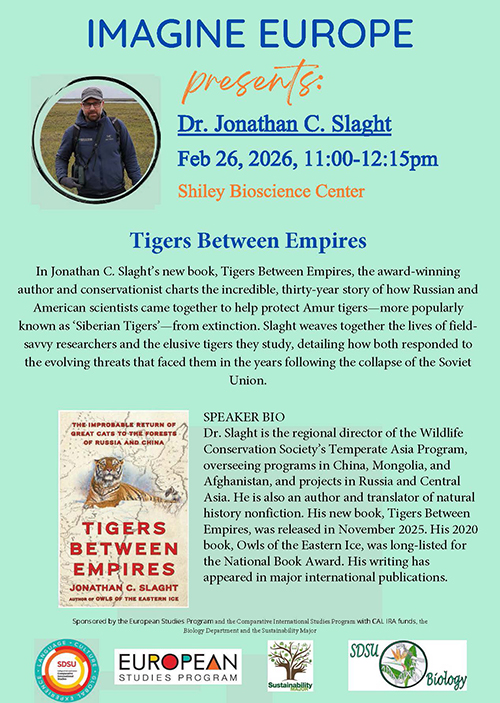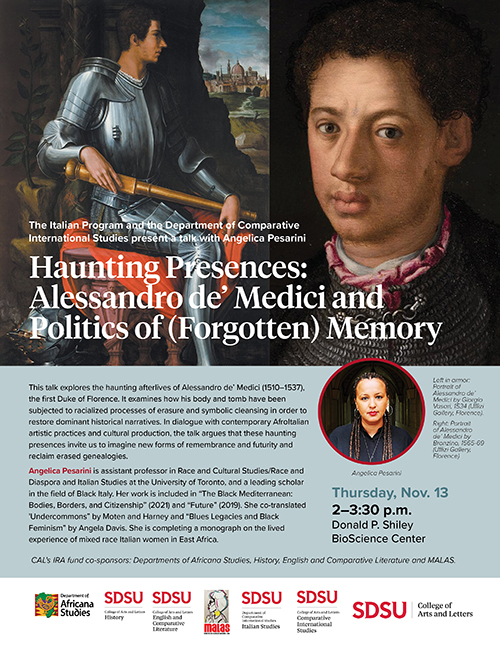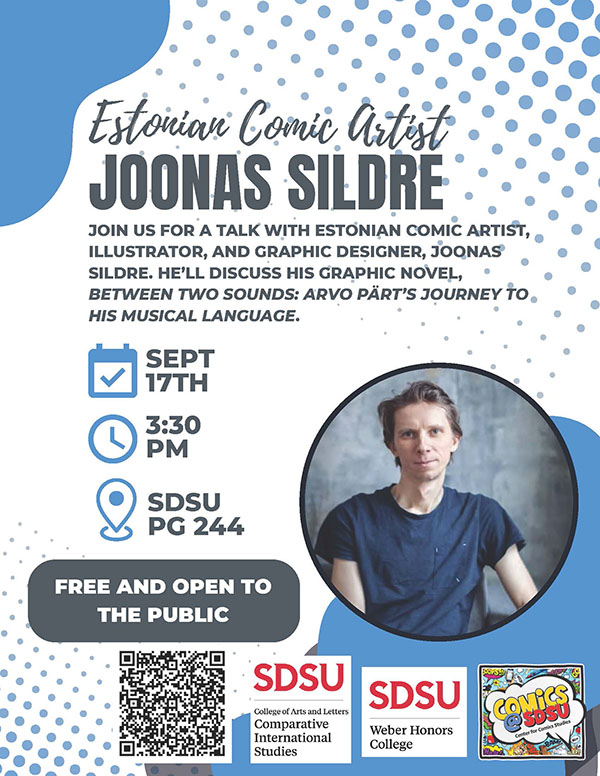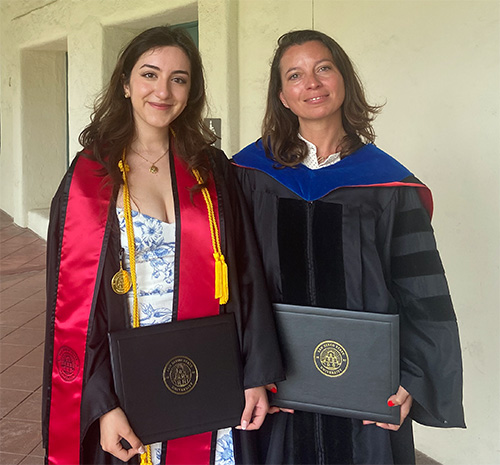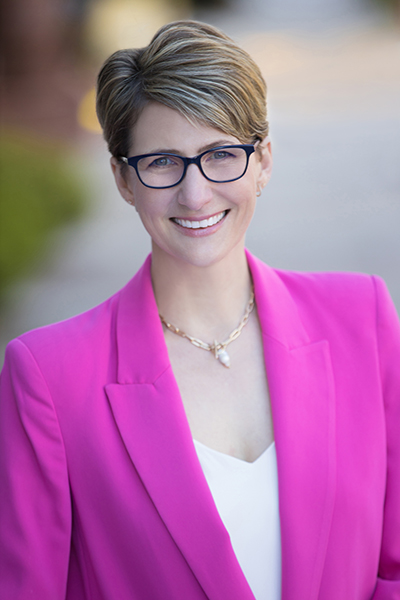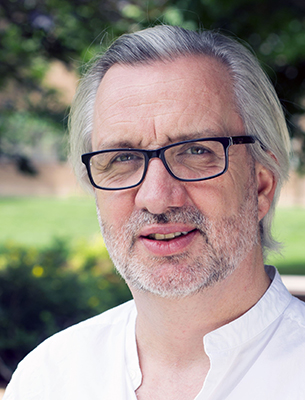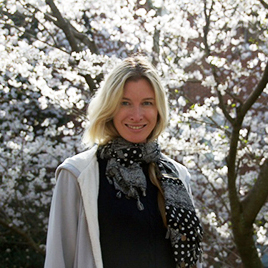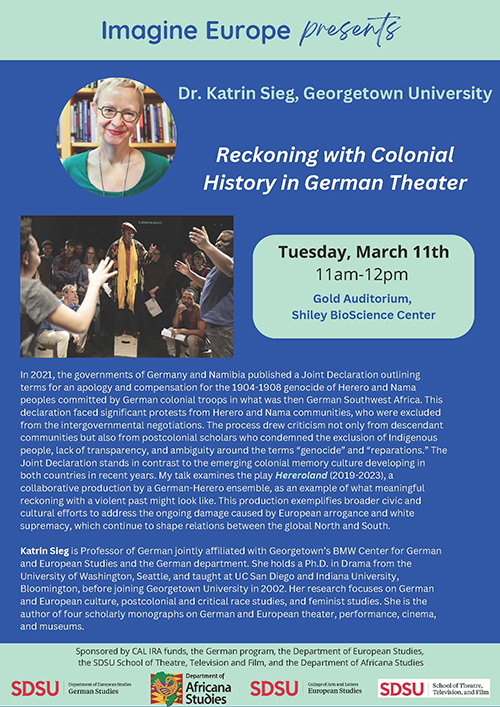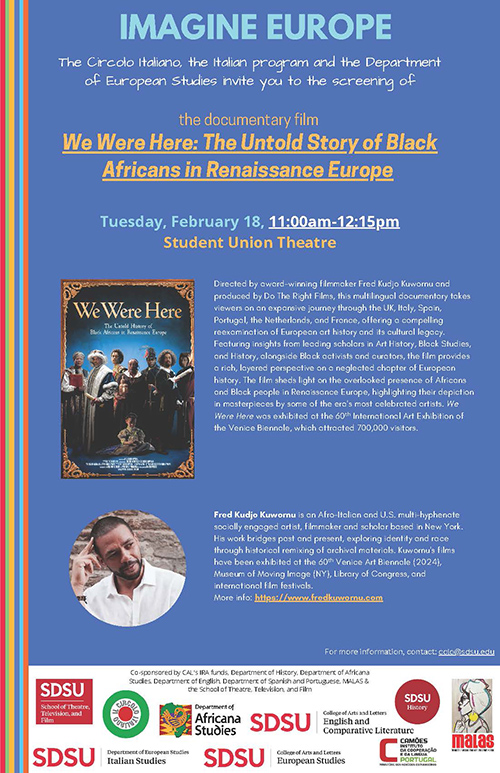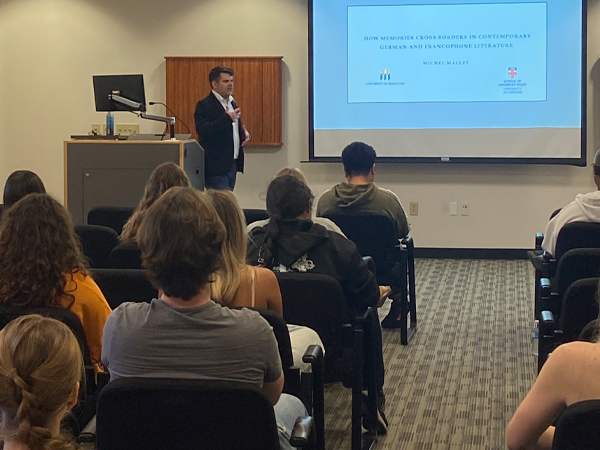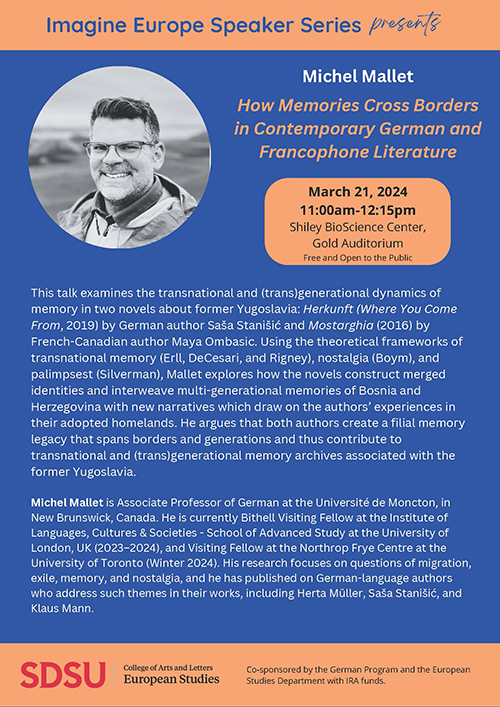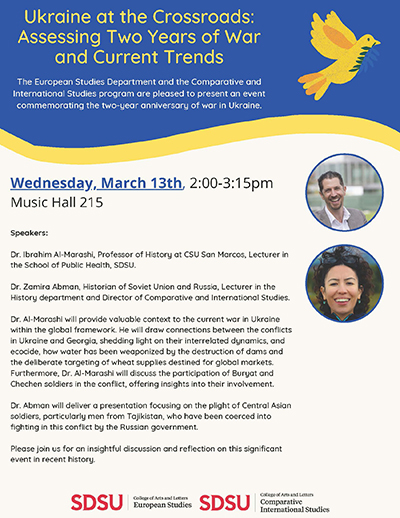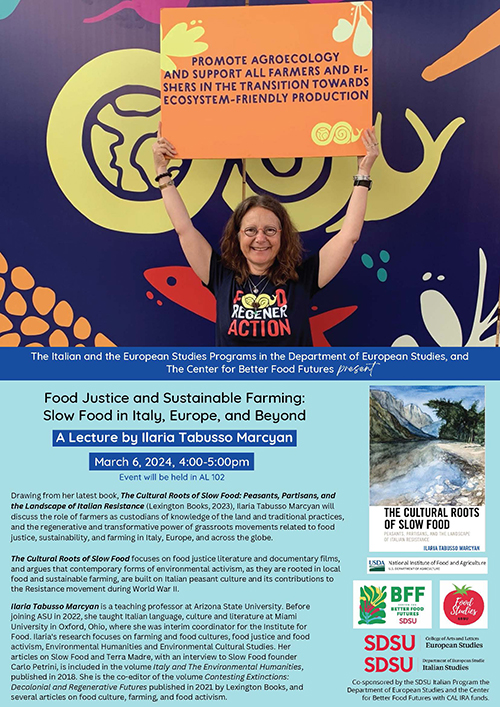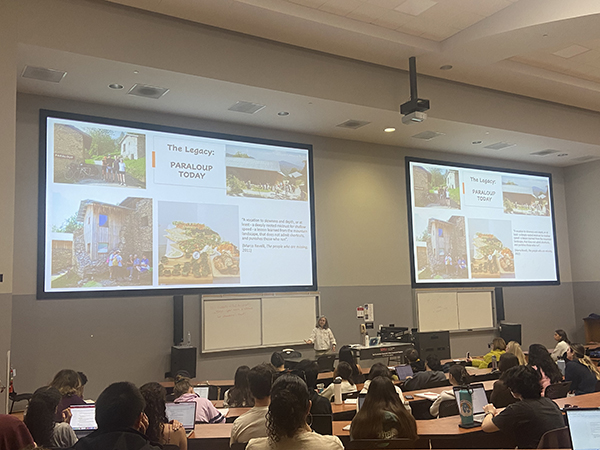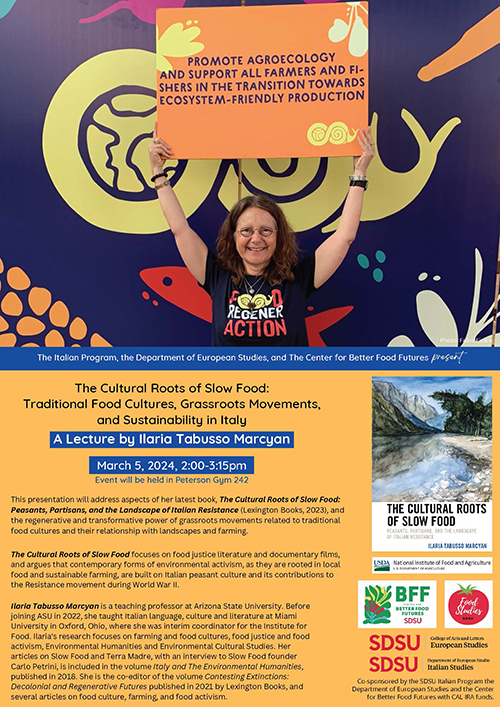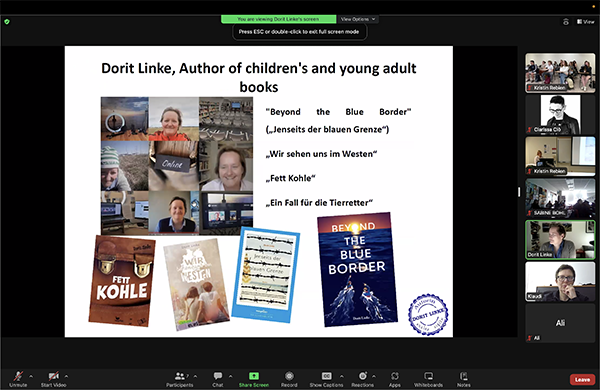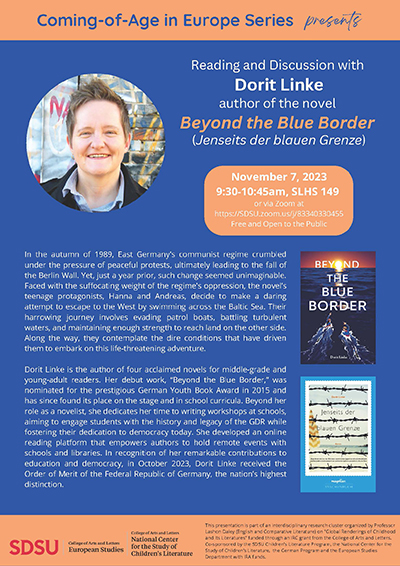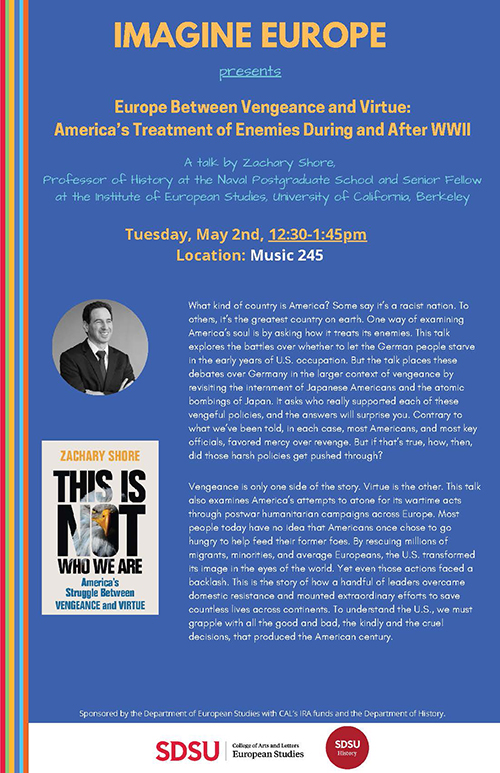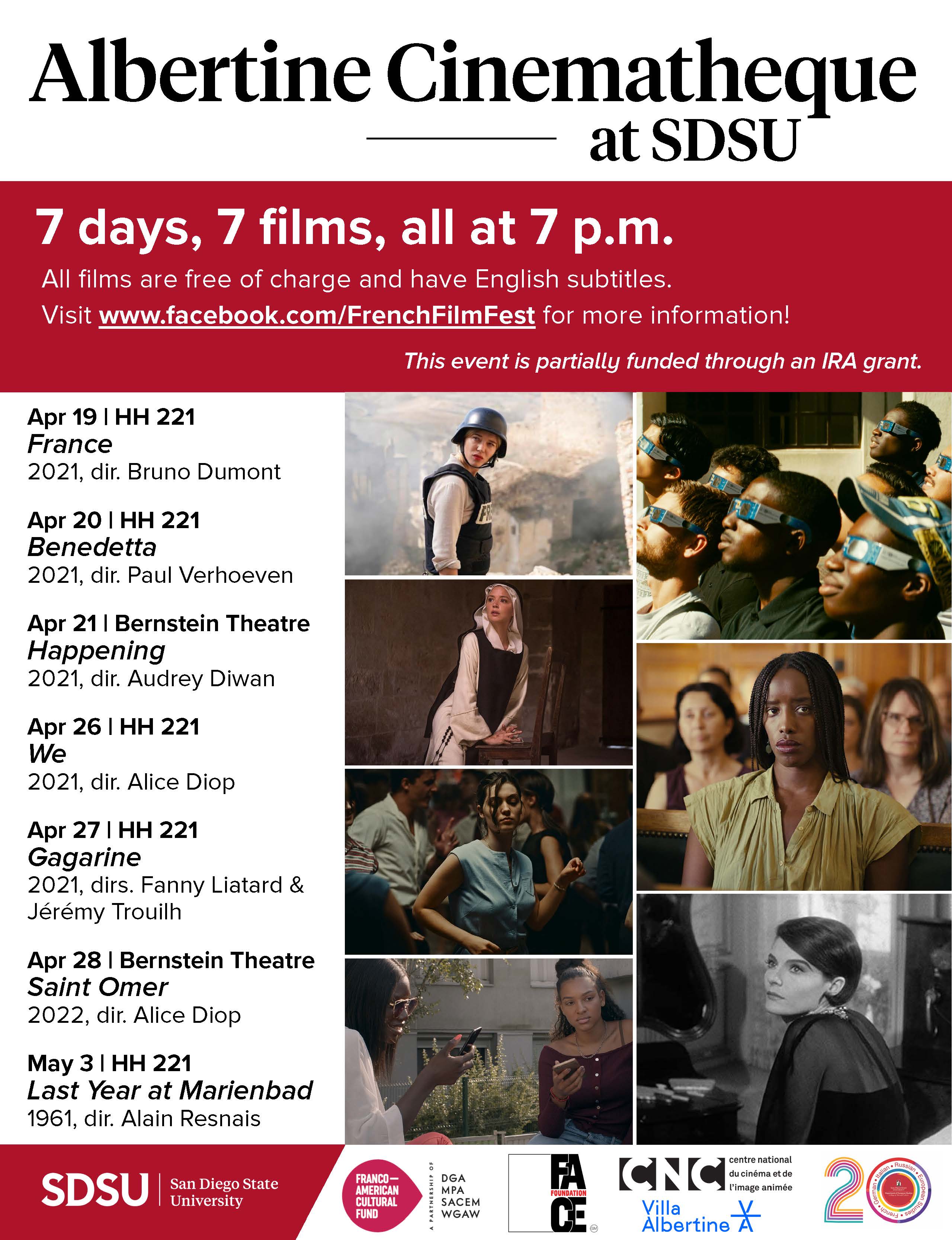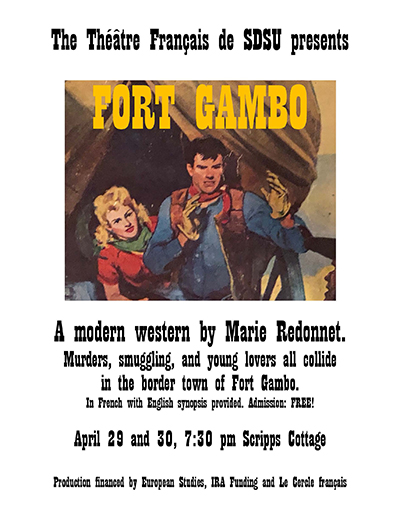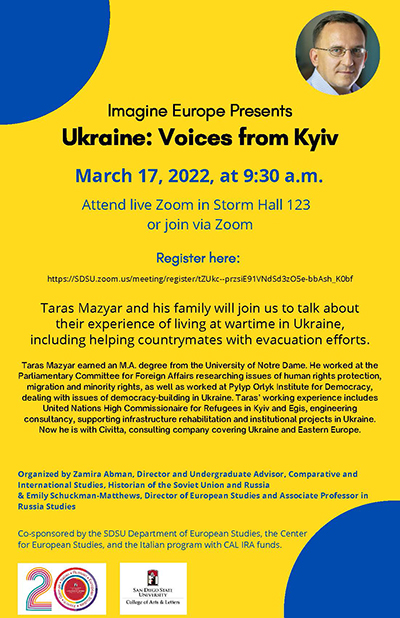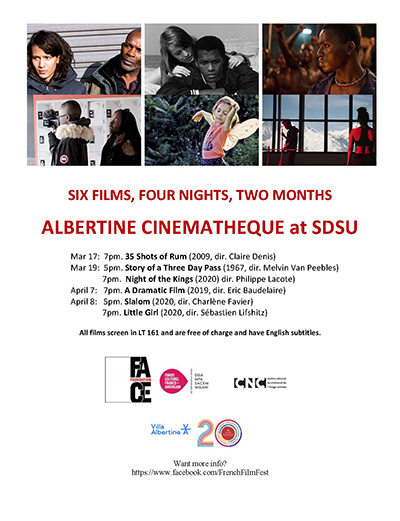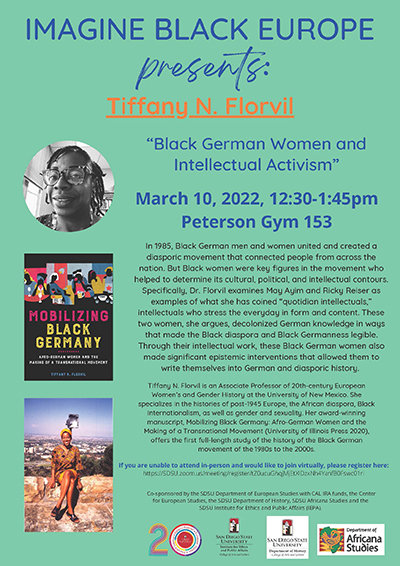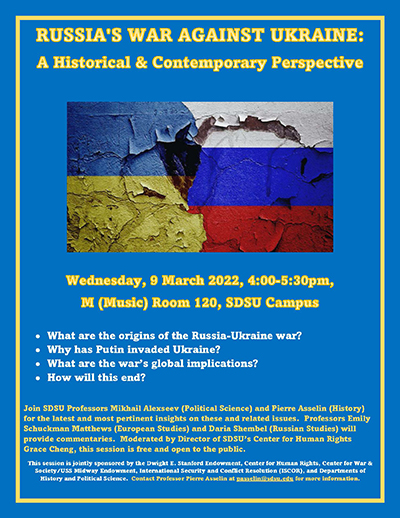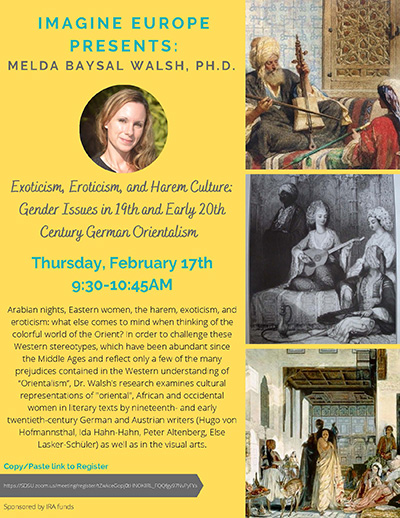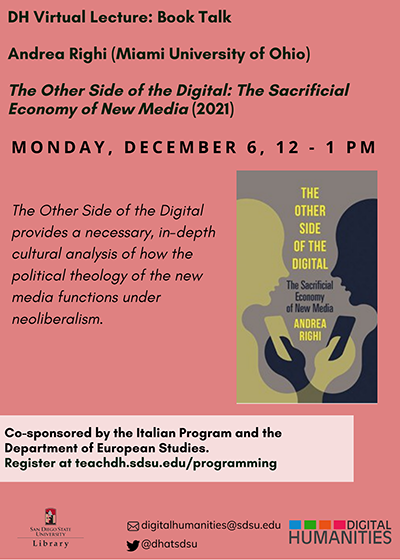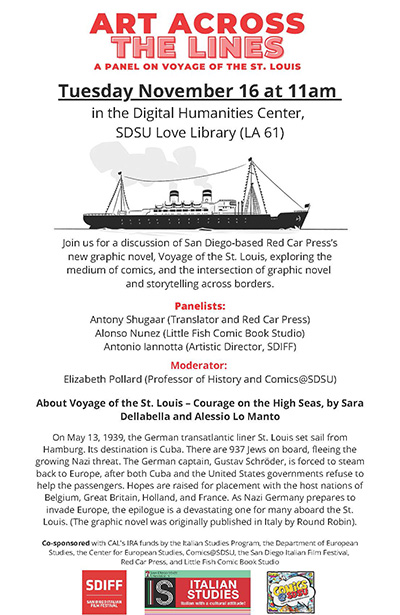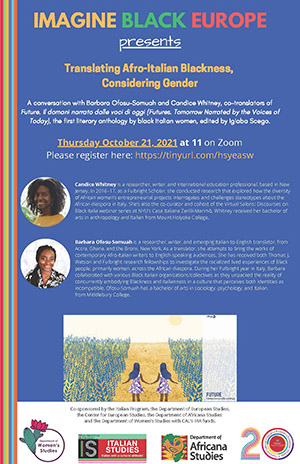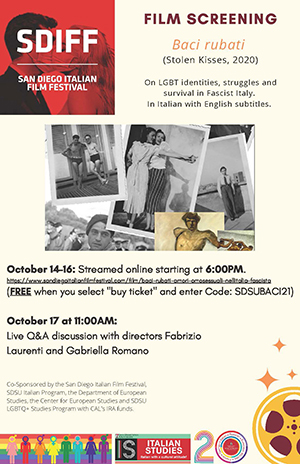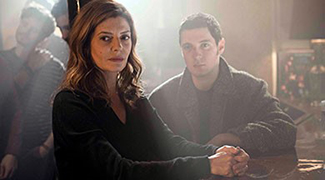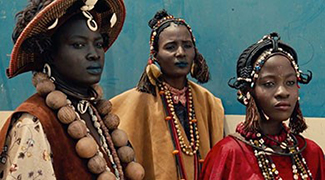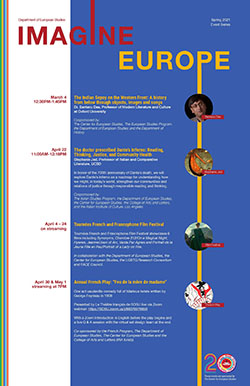
News & Events
Journalism & Environmental Justice in Tajikistan
Featuring Sher Khashimov, activist journalist from Tajikistan based in Washington, D.C.
Thursday, April 9, 2026
12:30-1:45 p.m.
in Engineering, Room 328
Join HIST 586 students for a conversation with Sher Khashimov as he discusses the realities of journalism in Central Asia and the lasting environmental impacts of the Soviet regime in the Muslim periphery.
Drawing from his professional andpersonal experience, Khashimov will explore the relationship between media, power, environmental degradation, and activism in the post-Soviet world.
Sponsored by CAL Instructionally Related Activity Funds, the Center for Islamic and Arabic Studies, and the Department of Comparative International Studies.
Book Presentation by Zamira Abman
Tuesday, March 17, 2026
12:30-1:45 p.m.
in Engineering, Room 328
Join us for a discussion of “Coerced Liberation: Muslim Women of Soviet Tajikistan” (University of Toronto Press, 2024) by Zamira Abman.
“Coerced Liberation” examines the lives of Muslim women in Tajikistan during the Soviet era (1920s 1980s), when state-led modernization campaigns sought to “emancipate” women from patriarchal traditions.
Through unique archival research and extensive oral histories, Zamira Abman uncovers how women navigated unveiling campaigns, education reforms, labor mobilization, and shifting expectations of family and gender.
From CINTS to Taiwan: Graduate Study & Global Careers
Friday, March 6, 2026
12 p.m.
in Storm Hall (SH) 222D
Can’t make it in person?
Join us via Zoom
Join CINTS alum Samuel Straw (’20) as he shares his experiences studying and working in Taiwan. He will discuss the realities of life abroad and insights from his academic and professional journey.
Samuel Straw is the Head of Research at the Taiwan Digital Diplomacy Association. He holds a B.A. from San Diego State University and an M.A. from National Chengchi University.
Imagine Europe presents: Dr. Jonathan C. Slaght
“Tigers Between Empires”
Thursday, Feb 26, 2026
11-12:15 p.m.
at the Shiley Bioscience Center
In Jonathan C. Slaght’s new book, "Tigers Between Empires", the award-winning author and conservationist charts the incredible, thirty-year story of how Russian and American scientists came together to help protect Amur tigers -- more popularly known as Siberian Tigers’ -- from extinction. Slaght weaves together the lives of field savvy researchers and the elusive tigers they study, detailing how both responded to the evolving threats that faced them in the years following the collapse of the Soviet Union.
Jonathan C. Slaght is the regional director of the Wildlife Conservation Society’s Temperate Asia Program, overseeing programs in China, Mongolia, and Afghanistan, and projects in Russia and Central Asia. He is also an author and translator of natural history nonfiction. His new book, "Tigers Between Empires," was released in November 2025. His 2020 book, "Owls of the Eastern Ice," was long-listed for the National Book Award. His writing has appeared in major international publications.
Sponsored by the European Studies Program and the Comparative International Studies Program with CAL IRA funds, the Biology Department and the Sustainability Major.
"Sports in the Borderlands, the Borderlands of Sports - A Case From Skateboarding"
A talk by Andrea Buchetti, Ph.D. (University of Padua)
Thursday, December 4, 2025
4-6 p.m.
in Storm Hall 205
Reception with Italian refreshments to follow
Borderlands are diffuse cultural matrices through which power, desire, and social creativity are negotiated daily. I articulate this perspective by building on my fieldwork on skateboarding at the U.S.-Mexico border in dialogue with the contemporary anthropology of sports and popular cultures.
Sponsored by the Departments of Chicana and Chicano Studies and Sociology, the Center for Latin American Studies, and Comparative International Studies (Italian Program), the Center for Skateboarding, Action Sports, and Social Change, the Surf and Skate Studies Collaborative, and the Master of Arts in Liberal Arts & Sciences (MALAS) Program.
Haunting Presences: Alessandro de’ Medici and Politics of (Forgotten) Memory
The Italian Program and the Department of Comparative International Studies present a lecture by Angelica Pesarini
Thursday, November 13, 2025
2-3:30 p.m.
Gold Auditorium, Donald P. Shiley BioScience Center
This talk explores the haunting afterlives of Alessandro de’ Medici (1510–1537), the first Duke of Florence. It examines how Alessandro’s body and tomb have been subjected to racialized processes of erasure and symbolic cleansing in order to restore dominant historical narratives. In dialogue with contemporary AfroItalian artistic practices and cultural production, the talk argues that these haunting presences invite us to imagine new forms of remembrance and futurity and reclaim erased genealogies.
Angelica Pesarini is an assistant professor in Race and Cultural Studies/Race and Diaspora and Italian Studies at the University of Toronto, Canada, and a leading scholar in the field of Black Italy. She is the author of several essays, articles, book chapters and co-author of "The Black Mediterranean: Bodies, Borders, and Citizenship" (202l). She co-translated "Undercommons" by Moten and Harney and and "Blues Legacies and Black Feminism" by Angela Y. Davis. She is completing a monograph on the lived experience of mixed race Italian women in East Africa.
CAL's IRA funds co-sponsors: Departments of Africana Studies, History, English and Comparative Literature and MALAS.
Estonian Comic Artist: Joonas Sildre
Wednesday, September 17, 2025
3:30-5 p.m.
in Peterson Gym (PG) 244
Free and Open to the Public
Join us for a talk with Estonian comic artist, illustrator, and graphic designer, Joonas Sildre. We'll discuss his graphic novel, "Between Two Sounds: Arvo Pärt’s Journey to His Musical Language."
Sponsors: The Department of Comparative International Studies, Center for Comics Studies, and Weber Honors College
News Archives
CINTS Outstanding Graduating Senior for 2025
Congratulations to Katherine Mansfield, this year's Outstanding Graduating Senior, and her Most Influential Faculty Member, Zamira Abman.
Katherine is graduating summa cum laude with a Bachelor of Arts in Comparative International Studies with minors in Interdisciplinary Studies and French. During her undergraduate degree, Katherine spent a year studying abroad at Sciences Po in Paris, where she represented Sciences Po at the Sorbonne Model United Nations competition. While at SDSU, Katherine acted as Department Representative for Aztec Recreation in the on-campus Student Advisory Leadership Team. She was also an International Ambassador for the International Student Center. After graduation, Katherine will return to Paris to pursue a Master in Economic Law at Sciences Po.

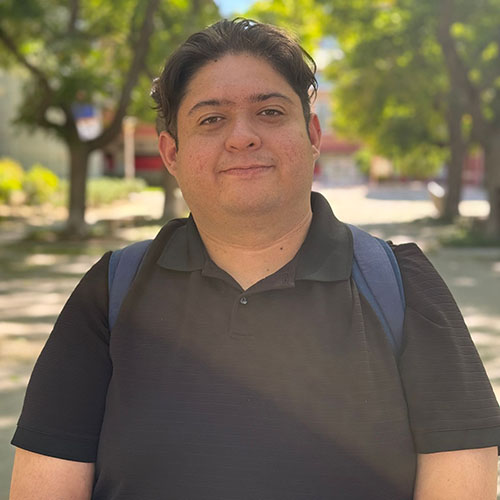
European Studies Outstanding Graduating Senior 2025
Congratulations to this year’s Outstanding Graduating Senior in European Studies, Raul Rodriguez.
Raul Rodriguez is a first-generation college student with a passion for learning languages and new cultures. He was born in San Diego but grew up in Tijuana, Mexico. When Raul started his journey at Southwestern College, he realized he wanted to pursue a career in translation and/or interpretation, and he considered learning a new language an essential part to reach his goal. During his time at Southwestern College, he decided to pursue an associate degree in Italian and became vice president of the Italian club. When Raul was in the process of applying to universities, he was looking for a program that offered him the opportunity of an experience abroad, and this is how he found the Department of European Studies. When he read about the program, he fell in love with the topics presented. The best part? He saw the opportunity he was looking for: the Florence Summer Abroad program.
At SDSU, Raul has achieved remarkable accomplishments that far exceeded his expectations. In the spring semester of 2024, he represented SDSU at the Schuman Challenge in Washington, D.C., an annual foreign affairs contest for undergraduate students in the United States organized and hosted by the EU Delegation. He defines this experience as transformative and something that would not have happened without the support of his professors and the European Studies program. In the summer of 2024, Raul fulfilled his dream of studying abroad by participating in the Florence Summer Program, where he delved into the history of the Etruscans and the Renaissance. Furthermore, during the application process for this program, Raul was honored with the Benjamin A. Gilman International Scholarship awarded by the U.S. Department of State’s Bureau of Educational and Cultural Affairs, another significant achievement.

(left to rigtht): Emily Schuckman-Matthews, Clarissa Clò, and Kristin Rebien
Raul will graduate with Summa Cum Laude honors and is very grateful for everything he has learned in the past two years. He says that one of his goals is to talk to his friends about the classes he has taken and encourage them to take them.
Upon graduation, Raul intends to collaborate with the Gilman Program on projects they offer to their alumni. Additionally, he aims to apply to volunteer programs in Italy to enhance his Italian language skills, with the ultimate goal of enrolling in the Master of Arts in Translation program offered by Georgetown University in approximately two or three years.
Lastly, Raul wanted to thank his most influential faculty member, Clarissa Clò, and professors Emily Schuckman-Matthews and Kristin Rebien. They played a crucial role in his experience at SDSU, and he considers them role models in his academic career.
Celebrating Excellence: Zamira Abman Receives Humanities Award for Dedication and Innovation
The SDSU Division of Research and Innovation recently hosted its annual event to recognize faculty and other scholars for their outstanding contributions. This prestigious gathering recognized those who have demonstrated exceptional dedication and innovative thinking in their respective disciplines. Among those honored this year was Zamira Abman, who serves as the director of the CINTS program and is a Professor of History and European Studies.
Receiving one of this year's Humanities Awards is a testament to Zamira's exemplary scholarship and dedication. It highlights her significant achievements in research as well as her passion for fostering intellectual curiosity among her students. The award serves as a recognition of her tireless efforts to contribute to the academic landscape and inspire future generations of scholars.
Congratulations to Zamira on this well-deserved recognition! Her remarkable contributions to the field continue to resonate, and we look forward to seeing the ongoing impact and future contributions of this esteemed scholar to the humanities.

Clarissa Clò wins prestigious Flaiano International Award for Italian Studies
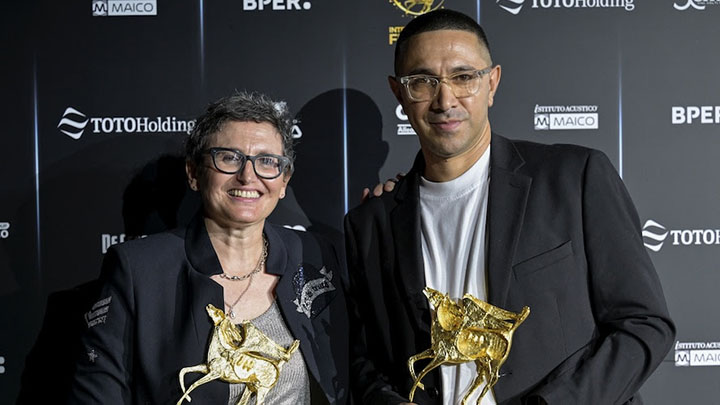
(From left) Clarissa Clò and Amir Issaa
Work on the critical bilingual edition and English translation of Italian-Egyptian rapper Amir Issaa’s memoir, along with a team of students and academics, was recognized by the Premi Internazionali Flaiano and the Italian Ministry of Foreign Affairs and International Cooperation.
This inspiring collective project, published by SDSU Press, was five years in the making.
It began when Clarissa Clò, professor of Italian and chair of European Studies was asked to help find an American publisher for Amir Issaa’s memoir, “Vivo per questo” (“This Is What I Live For”) in 2019. Issaa is a hip-hop artist, educator, and author who grew up in Rome, Italy and uses rap and the power of words and rhymes to tell the powerful story of overcoming his difficult youth to a worldwide audience.
Read the full story on the CAL website.
Outstanding Graduating Senior 2024

(From left) Madison Saylor and Amy Harker-Rosskopf
Congratulations to this year's European Studies Outstanding Graduating Senior (French), Madison Saylor, and Most Influential Faculty, Amy Harker-Rosskopf!
Madison Saylor is a 22 year old student from Northern California. This year she is
graduating summa cum laude as a double major in French and English. In addition to
this education, in the past four years Madison has worked as a Teacher’s Assistant
and a Private Tutor in both English and French. She is now a member of the Phi Beta
Kappa Academic Society and in 2023 she was the recipient of the SDSU Aztec Alumni
Scholarship. After graduation Madison will continue her education by pursuing an MFA
in Creative Writing at SDSU, where she will use the skills learned in both her undergraduate
degrees to make her own written contributions to the world. With this degree she also
plans to begin teaching college level courses and sharing with upcoming students her
love of English and French literature. Originally Madison fell into the language program
by happy accident, but she quickly discovered her love for the French language, culture,
and literature. Madison is thankful for all that she has learned as a part of the
SDSU French program and attributes much of her current and future success to the amazing
professors and faculty in this program. She is grateful to have received this award
and hopes to remain involved with the French Program in the future.
Outstanding Graduating Senior 2023
Congratulations to this year's European Studies Outstanding Graduating Senior, Sama Kenda Aziz, and Most Influential Faculty, Dr. Felicitas Jaima!
"My time spent studying German at SDSU was incredibly insightful and helped me refine
my language and cultural skills even more than the time I lived in Germany. Some of
the most interesting classes I took during my studies were the German ones, and they've
helped me develop a strong understanding of what it means to really become fluent
in a foreign language. This Fall I will be getting my master's degree in economics
from Peking University in China, with plans to work on research and continue on the
international studies track."
-Sama Aziz
Students Participate in Foreign Affairs Competition in Washington, D.C.
Students from the Department of European Studies were among 30 collegiate teams from across the U.S. that participated in the 2023 Schuman Challenge on March 30-31. The annual competition invites teams of three-four undergraduate students to respond to a topic impacting transatlantic relations and present before a panel of judges.
The SDSU team featured students Ilias Benbatoul, Marek Fialkiewicz, and Hadil Salih and faculty mentors Kristin Rebien and Kylie Sago. The students entered the competition with a proposal to establish an EU-U.S. Committee on Indigenous Land Stewardship. The committee would amplify the voices of Indigenous peoples in Northern Europe and the U.S. by including their expertise in biodiversity protection. Their proposal grew from a class project for EUROP 301, Contemporary Europe.
The team presented their proposal to three judges, including a high-ranking official of the EU Delegation to the U.S., a member of the European Parliament, and a diplomat at the U.S. embassy in Finland. The judges praised their presentation for filling a gap in current transatlantic cooperation, foregrounding fundamental human needs, and clarity of their production.
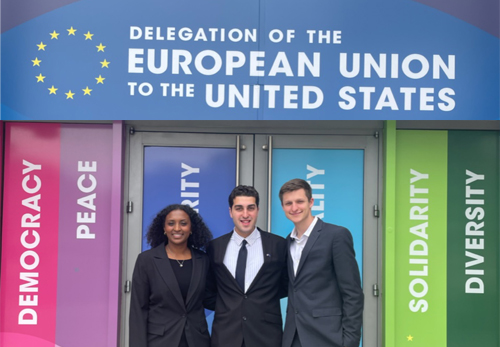
Ilias Benbatoul, Hadil Salih, and Marek Fialkiewicz outside the competition.
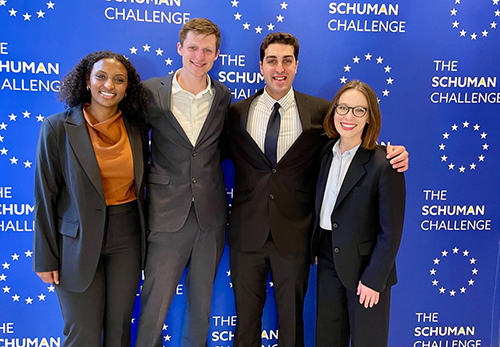
Ilias Benbatoul, Marek Fialkiewicz, Hadil Salih, and faculty mentor, Kylie Sago
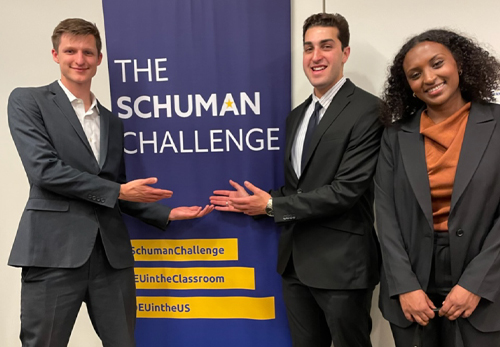
Marek Fialkiewicz, Hadil Salih, and Ilias Benbatoul
New book by Emily Schuckman Matthews Examines Archetypal Characters in Russian Culture
With characters like Sonia Marmeladov from “Crime and Punishment,” the appearance of prostitutes for more than 100 years in popular Russian literature and media is expected.
Despite sex workers appearing so often in Russian fiction, few scholars have closely examined what these archetypal characters represent in Russian culture and how that compares to the reality in modern life.
Emily Schuckman Matthews authored a new book on the subject, “Sex Work in Contemporary Russia: A Cultural Perspective,” published by Lexington Books. Shuckman Matthews is an associate professor of European Studies and the European Studies program director at San Diego State University.
Read the full story on the CAL website.
Schulze Appointed Co-Editor
Mat Schulze, German Professor and LARC director, has been appointed co-editor of Teaching German, one of the most prestigious German journals in the US. The journal’s central focus is teaching and pedagogy.
Congratulations Mat!
Recent Graduate Finds Language Learning Unlocks the Door to a Whole New World
With her sights set on a future career in optometry, biology student finds value in adding foreign language study to her skills set
Diva Zeckua Barajas understands the value in language learning. She grew up in San Diego in a household where Spanish was primarily spoken. The experience showed her how language barriers affect people as they navigate the basics like grocery shopping, traveling, and visiting a doctor.
When she entered SDSU with a focus on sciences, she made it her mission to learn different languages to open up future possibilities and create deeper connections with non-native speakers. “Language learning has complemented my studies,” Barajas said. She graduated this year with a degree in biology along with minors in Italian studies and leadership development. She’ll begin the Doctor of Optometry program at Western University of Health Sciences in the fall.
Read the full article on the CAL website.
War on Ukraine 2022: Perspectives from Faculty and Students
CAL faculty respond rapidly, broadly, and with compassion to help students contextualize and understand the current global crisis.
By Leslie L.J. Reilly
A collective community of scholars and experts on issues of war, Russia, and the Ukraine from CAL departments of European studies, political science, and history, the Jewish studies program, the Center for Human Rights, and the Center for War and Society, give students a chance to engage in critical conversations to help them understand the impacts of the current war on Ukraine.
“Let us be united in our compassion for one another,” said Dean Monica J. Casper. “And let us also do what CAL does especially well – apply our analytical skills to understanding the conditions and consequences of war.”
European Studies Department Takes Action
Daria Shembel, Russian studies director and adviser along with European studies program director Emily Schuckman-Matthews have both restructured their syllabi in order to help students contextualize and understand this war as well as work through the wide range of emotions they are all feeling.
Read the full article: SDSU NewsCenter | College of Arts and Letters
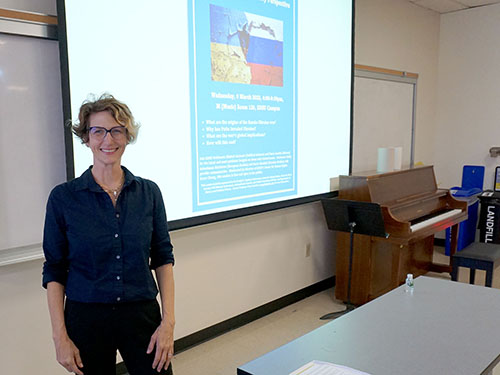
Emily Schuckman-Matthews at March 9 event:
Russia’s War Against Ukraine: A Historical and Contemporary Perspective
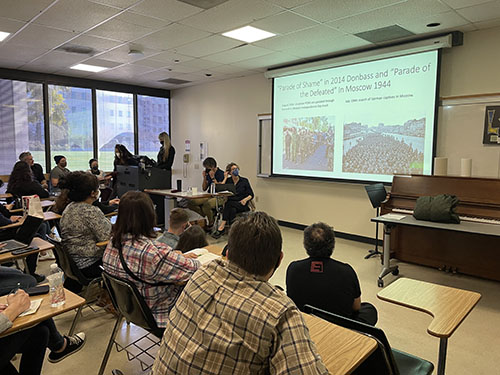
Daria Shembel and Emily Schuckman-Matthews at March 9 event:
Russia’s War Against Ukraine: A Historical and Contemporary Perspective
Professor Anne Donadey (French and Women’s Studies) is the 2021-22 College of Arts and Letters recipient of one of the major awards given at SDSU, the Alumni Association Award for Outstanding Faculty Contributions to the University. This award is bestowed annually to an outstanding faculty member from each of SDSU’s colleges and the library. It is presented at the all-university convocation at the beginning of the fall semester. This award comes at the perfect time to help Anne celebrate her 20 years at SDSU—time sure flies!
In spite of difficulties relating to the pandemic, in December 2020, the department celebrated its 20th anniversary through a wonderful and inspiring virtual celebration that featured a keynote speech by Professor Emerita Edith J. Benkov and drew a large number of attendees. Kudos go to department chair Clarissa Clò, departmental administrative coordinator Veronica Gonzalez, and French lecturer Susanne Forrayi for organizing this terrific event! Watch the 20th anniversary montage video on our website.
The same dynamic team was responsible for creating and implementing a new departmental initiative, the Imagine Europe Podcast. The inaugural podcast features Professor Emerita Edith Benkov being interviewed about the history of the department by Professor Clarissa Clò, with original music by Holly Ransom Thomson. The second podcast features lecturer Rosamaria Ruggeri being interviewed about the role of women in the 1940s Manifesto of Ventotene and her experiences growing up in Italy in the formative decades of the 1960s and 1970s. The podcasts are available on our website.
In 2020-2021, four of our faculty members received awards in support of their projects to develop inclusive curriculum:
Associate Professor Emily Schuckman-Matthews (European Studies) was awarded 3 units of assigned time from the College of Arts and Letters to develop inclusive curriculum for the European Studies program.
Lecturers Sonia Brighenti and Silvia Kading (Italian) received a 2021-22 team Equity Mini-Grant from SDSU’s Center for Inclusive Excellence to make materials for first-year Italian courses entirely accessible (including captioning their many Italian video lectures for asynchronous classes) following the principles of Universal Design for Learning.
Lecturer Felicitas Jaima (German) received a 2021-22 individual Equity Mini-Grant from SDSU’s Center for Inclusive Excellence to implement the use of new textbooks and develop new syllabi for lower-division German classes that will present a more racially and culturally inclusive picture of Germany.
Assistant Professor Cecilia Benaglia (French and Italian) was awarded 3 units of assigned time from SDSU’s Division of Research and Innovation to enhance her Research/Scholarship/Creative Activity (RSCA).
Associate Professor Emily Schuckman-Matthews (European Studies) has been very active. She was fully funded to participate in a week-long Brussels study tour (sponsored by the EU, the University of Pittsburgh’s European Studies Center, the Center for European Study at UNC, and the Eurasian Studies Program at Florida International University, to be held in Summer 2022). She was also accepted to the 2021 Virtual Summer Research Laboratory on Russia, Eastern Europe and Eurasia at the University of Illinois. Finally, she joined the Campus Editorial Committee at EuropeNow, an online magazine/journal published by the Council for European Studies.
As Director of the Language Acquisition Resource Center, Professor Mathias Schulze (German and European Studies) received major grant funding for three LARC projects: the National Language Training Center, STARTALK Teacher Camps, and the Southern Area International Languages Network (SAILN).
Lecturer Florence Miquel (French) received a range elevation in 2021. Lecturers who have been at rank for eight years are eligible for range elevation. Range elevations are awarded based on the high quality of instruction provided to students.
Administrative Coordinator Veronica Gonzalez celebrated her first year in our department and is now a permanent staff person, to the delight of each and every one of us!
Last but not least, Diana Jimenez (French) was selected as the department’s Outstanding Graduating Senior. Diana is joining our MA in French in Fall 2021. She selected lecturer Holly Ransom Thomson as her Most Influential Faculty member. This marks the 8th time in our department’s 20-year history that Holly has been selected for this honor: 2002, 2006, 2008, 2010, 2011, 2014, 2020, and 2021 – quite a track record!
Congratulations to all on your achievements, which are even more impressive during this difficult Covid-19 period!
Assistant Professor of French and Italian Cecilia Benaglia joined the department in August 2018. She holds a PhD in French and Comparative Literature
from the Johns Hopkins University and was the recipient of a prestigious Andrew W.
Mellon Postdoctoral Fellowship at McGill University, Canada in 2017-18.
Assistant Professor Cecilia Benaglia (French and Italian) and Professor Edith Benkov (French and European Studies) each received a major award from the College of Arts and Letters in 2020: Benaglia received the Excellence in Research award and Benkov the Excellence in Service award.
Assistant Professor Cecilia Benaglia (French and Italian) and Professor Anne Donadey (French and Women’s Studies), were both awarded competitive Critical Thinking Grants (one course release each) for Fall 2020 to further their research and publication projects. Associate Professor Kristin Rebien (German and European Studies) was awarded a Critical Thinking Grant for Fall 2018 and a Mid-Career Grant for Faculty Professional Development for Fall 2019.
Three of our tenured faculty members received whole year at half pay sabbatical leaves to work on their scholarly books: Associate Professor Kristin Rebien (German and European Studies) for 2020-2021; Professor Clarissa Clò (Italian and European Studies) for 2019-2020; and Associate Professor Emily Schuckman Matthews (European Studies) for 2018-2019.
Associate Professor Kristin Rebien (German and European Studies) and full-time lecturer Holly Ransom Thomson (French and European Studies) each received an Assigned Time for Exceptional Service to Students Award (one course release each) in Fall 2019.
Lecturer Silvia Kading (Italian) received the SDSU Cap & Gown Chapter of Mortar Board Award in 2017 in recognition of her contribution to the academic achievement of SDSU Mortar Board student members.
Lecturers Christine Guzman (German) and Holly Ransom Thomson (French and Francophone Studies) received a range elevation in 2018; Amy Harker Rosskopf (French and Francophone Studies) received one in 2019; Rosamaria Ruggeri (Italian) and Daria Shembel (Russian) also received one in 2020. Lecturers who have been at rank for about fifteen years have been eligible for range elevation. Range elevations are awarded based on the high quality of instruction provided to students.
Alumnus Maxime Mianzokouna (French MA graduate, 2009) earned a PhD in Africology at the University of Wisconsin Milwaukee in December 2018. His dissertation is titled “Developmental State Economic Model versus Neo-classical Principles: The Case of Rwanda and Burundi.”
Alumna Kathryn Schlosser (French MA graduate, 2005) earned a PhD in French and Francophone Studies at UCLA in 2018. Her dissertation is titled “Voices of Silence in Francophone Women’s Literature: Comparisons of Algerian and Mauritian Novels.”
Michaela Setiawan (French and Francophone Studies and Criminal Justice) was the department’s 2020 Outstanding Graduating Senior. She selected Holly Ransom Thomson as her Most Influential Faculty Member.
Samantha Bower (Russian and Linguistics) was the department’s 2019 Outstanding Graduating Senior. She selected Dr. Daria Shembel as her Most Influential Faculty Member.
Christopher Deutschman (Mechanical Engineering and German) was the department’s 2018 Outstanding Graduating Senior. He selected Associate Professor Kristin Rebien as his Most Influential Faculty. Lisette Kelly, 2018 Outstanding Graduating Senior in Comparative International Studies, selected Professor James Schorr as her Most Influential Faculty.
Zachary Woodall, Outstanding Graduating Senior in Russian Studies
I was born in San Diego, but spent most of my life in a small town in southern Utah. There I started my academic journey at the only state university in the city at 18, and a year later I came back to California to continue my education at Grossmont College, and then at SDSU. It wasn’t until my third year at university that I finally declared Russian as my major.
It’s hard to explain where my interest for Russian culture and desire to learn Russian come from, since I don’t have a single Russian or even Russian-speaking relative to practice with, and the places where I’ve lived up until this point aren’t exactly world-renowned for their Russian-speaking diaspora. But I think that’s just the point: There really is no good explanation for it. It just happened that way.
However, I couldn’t have picked a more motivating and fitting major to dedicate my academic career to, especially in light of recent events, when more (not less) understanding between different peoples is necessary to come to a solution that everyone can benefit from.
Daria Shembel, Most Influential Faculty Member
Professor Daria Shembel is the only professor who could fit the role of Most Influential Faculty Member for me. No one else has had such an impact on my understanding of Russia, Russian culture, the language and beyond, like Dasha has, and she has supported me with her time, patience and advice throughout my whole SDSU experience. She has helped me develop the skills and knowledge that I value most dearly, and for this reason I have chosen her as my Most Influential Faculty Member. Thank you so much, Dasha!
Professors Edith Benkov and James Schorr (French and European Studies) fully retired in May 2020 after five years in the FERP program.
Elham (Ellie) Sadegholvad (Lecturer, German) retired in December 2019 after teaching German at SDSU for over twenty years. She will continue to direct the Persian language program at UCSD.
Professor Veronica Shapovalov (Russian and European Studies) retired in December 2018. She has come back to teach part time for us beginning in Fall 2019.
Associate Professor Mary Wauchope (German and European Studies) fully retired in August 2018 after two years in the FERP program.
Congratulations to Danielle Cervantes Stephens, whose article “How Community and Literary Engagement Derailed Colonial Exploitation” was published in Sartre Studies International. Danielle is a recent M.A. student in our French program and graduated in December 2021.
Assistant Professor Cecilia Benaglia (French and Italian) published a single-authored book, Engagements de la forme. Une sociolecture des oeuvres de Carlo Emilio Gadda et de Claude Simon (Classiques Garnier, 2020).
Professor Clarissa Clò (Italian) published a book chapter, “Mondo Exotica: Ethnography, Eros, and Exploitation in Italian Cinema of the 1960s and 1970s” in the edited volume Cinema of Exploration: Essays on an Adventurous Film Practice (AFI/Routledge, 2021).
In 2020, Professor Anne Donadey (French and Women’s Studies) published a single-authored book, The Algerian War in Film Fifty Years Later, 2004-2012 (Lexington). She also published a chapter on “Postcolonial Feminism, Gender, and Genre in Rachid Bouchareb’s Just like a Woman” in the edited volume ReFocus: The Films of Rachid Bouchareb (Edinburgh University Press).
Professor Mathias Schulze (German and European Studies) co-edited a special issue of the journal Language and Sociocultural Theory (2021) on Conceptualization and Orientation in Concept-based Language Instruction with B. White and G.A. Gánem-Gutiérrez. The special issue includes an introductory article on the topic by the three co-editors.
Professor Veronica Shapovalov (Russian and European Studies) published “Vilna Ghetto in Women’s Memoirs” in the Proceedings of the 13th International Academic Conference of Russian Association of Researchers in Women’s History dedicated to Men and Women in Traditional and Contemporary Culture: Preservation, Fixation, Understanding (Moscow: IZA-RAN, 2020).
Assistant Professor Cecilia Benaglia (French and Italian) published a single-authored book, Engagements de la forme. Une sociolecture des oeuvres de Carlo Emilio Gadda et de Claude Simon (Classiques Garnier) in 2020. She also published three journal articles: “L’apprentissage de la culture à travers les techniques du corps: savoir anthropologique chez Claude Simon” in Cahiers Claude Simon (2019); “L’héritage français et européen du roman italien des années 1960: un rendez-vous manqué” in Tangence (2018); and “Doxa/Paradoxa: Roland Barthes et l’engagement hors-scène” in Modern Language Notes (2017).
Professor Edith Benkov (French and European Studies) published “Courtship and Ritual” in the edited volume A Cultural History of Marriage in the Medieval Age (500-1450) (Bloomsbury, 2019).
Professor Clarissa Clò (Italian and European Studies) published two articles, “Passioni pulp e famiglie impossibili: diaspora, razza e sessualità in The Invisible Glass di Loren Wahl e Confetti for Gino di Lorenzo Madalena” in Ácoma: Rivista internazionale di Studi Nordamericani (2019) and “Disco Fever: Italian and American Diasporic Journeys” in Italian American Review (2018).
Professor Anne Donadey (French and Women’s Studies) published “Multilingual Strategies in Rachid Bouchareb’s Hors la loi” in the journal Contemporary French and Francophone Studies (2018). The article was co-authored by Wissem Brinis, an MA Candidate in French at SDSU who has since graduated. Donadey also participated in editing the volume Représentations de la guerre d’indépendance algérienne (Classiques Garnier, 2019), whose main editor is Maya Boutaghou. Donadey wrote the volume’s Afterword.
Dr. Felicitas Jaima (German) published “When Things Get Hairy: Afros, Cornrows, and the Desegregation of U.S. Military Hair Salons in West Germany” in the journal African and Black Diaspora (2017).
François Vanleene (formerly of the Language Acquisition Resource Center) and Professor Mary Ann Lyman-Hager (French and European Studies) published two journal articles, “Humanités numériques et pédagogie participative: Cas d’une classe expérimentale pluridisciplinaire inversée” (with Lise Mercurol) in Etudes de linguistique appliquée (2019) and “Flipping the Classroom to Teach an Exploratory French Civilization Course: An Interdisciplinary Approach” in the ADFL Bulletin of the Modern Language Association (2018).
Associate Professor Kristin Rebien (German and European Studies) published chapters in two edited volumes, “Sarmatien als politsche Utopie im Zeitalter der Berliner Mauer” in Sarmatien – Germanica Slavica – Mitteleuropa. Vom Grenzland im Osten über Bobrowskis Utopie zur Ästhetik des Grenzraums (Vandenhoeck & Ruprecht, 2020) and “Jenseits der Grenzen: Europa in der zeitgenössischen deutschen Literatur” in Das Politische in der Literatur der Gegenwart (de Gruyter, 2018).
Professor James L. Schorr (French and European Studies) published “The Economic Plight of ‘Spectators’ in the Early Eighteenth Century” in the edited volume Discourses on Economy in the Spectators / Discours sur l’économie dans les spectateurs (Verlag, 2018). His critical edition of Le Nouveau Spectateur français (1723-25) by Justus van Effen is about to be published by The Edwin Mellen Press in 2020.
Associate Professor Emily Schuckman Matthews (European Studies) published chapters in two edited volumes from Routledge, “The Prostitute as Everywoman: Examining the role and evolution of the sex worker in Russian Cinema” in Ruptures and Continuities in Soviet/Russian Cinema: Styles, characters, and genres before and after the collapse of the USSR (2018) and “Marginal or Central: Prostitution in Moscow” in World Film Locations: Moscow (2017).
Professor Mathias Schulze (German and European Studies) had three publications. His co-authored article “Learning trajectories and the role of online courses in a language program” appeared in the journal Computer Assisted Language Learning in 2018. He published another co-authored article, “Digital-gaming trajectories and second-language development” in the journal Language Learning & Technology (2017). His chapter “Computer-assisted language learning as complex adaptive systems” appeared in the Encyclopedia of Language and Education (Springer, 2017).
Professor Veronica Shapovalov (Russian and European Studies) published two articles, “Motherhood: Voices from the Gulag” in Focus on Gender: Studies in Anthropology, Family Ethnography and Social History of Everyday Life (2019) and “Analyzing A. I. Solzhenitsyn’s novel The First Circle through the prism of gender” in The Bulletin of Ryazan State University (2018). She also published two conference proceedings, “Strangers among their own: deported women form the Baltics in Russia (1941-1956)” [Chuzhie sredi svoikh; deportitovannye v Rossiiu zhenshchiny Pribaltiki 1941-1956)] in Women and Men in Migration Processes in Past and Present (2019) and “Women City-dwellers in the Gulag” [Gorozhanki v Gulage] in City Dwellers: Men and Women in Political, Economic, and Cultural Processes of Russian Urbanization XIV-XXI centuries (2018).
Dr. Daria Shembel (Russian and European Studies) published “When Women Call the Cuts: The Marina Razbezhkina School of Documentary Film” in the journal Apparatus: Film, Media, and Digital Cultures in Central and Eastern Europe in 2018.
Events Archives
A Gelato Love Story: The amazing journey through time, science, and taste
Thursday, March 13, 2025
2-3:15 p.m.
in Ellen Ochoa Pavilion, Rm 230
Join us for a fascinating journey through the world of gelato! In this interactive session, we'll explore the remarkable history of this beloved dessert, from its origins in Asia and the Middle East to its evolution in Italy and France. We'll uncover the science behind its creation, exploring the chemistry and ingredients that make it so special.
A compelling blend of scientist and artisan, Paola Richard brings her multifaceted expertise to the world of gelato. From her early career as a wildlife journalist and UN information officer to becoming a gelato innovator, Paola has channeled her passion for environmental stewardship and Italian culinary traditions into creating exceptional frozen desserts. As the founder of Gelato Love, her vision extends beyond simple dessert-making – it's about fostering a food renaissance that celebrates both excellence in taste and environmental consciousness. Under her guidance, Gelato Love has become a pioneer in natural, health-conscious gelato, offering innovative flavors that prove indulgence and wellbeing can coexist beautifully.
Imagine Europe presents: Dr. Katrin Sieg, Georgetown University
Reckoning with Colonial History in German Theater
Tuesday, March 11, 2025
11 a.m.-12 p.m.
in Gold Auditorium, Shiley BioScience Center
In 2021, the governments of Germany and Namibia published a Joint Declaration outlining terms for an apology and compensation for the 1904-1908 genocide of Herero and Nama peoples committed by German colonial troops in what was then German Southwest Africa. This declaration faced significant protests from Herero and Nama communities, who were excluded from the intergovernmental negotiations. The process drew criticism not only from descendant communities but also from postcolonial scholars who condemned the exclusion of Indigenous people, lack of transparency, and ambiguity around the terms “genocide” and “reparations.” The Joint Declaration stands in contrast to the emerging colonial memory culture developing in both countries in recent years. My talk examines the play Hereroland (2019-2023), a collaborative production by a German-Herero ensemble, as an example of what meaningful reckoning with a violent past might look like. This production exemplifies broader civic and cultural efforts to address the ongoing damage caused by European arrogance and white supremacy, which continue to shape relations between the global North and South.
Katrin Sieg is a Professor of German jointly affiliated with Georgetown’s BMW Center for German and European Studies and the German department. She holds a Ph.D. in Drama from the University of Washington, Seattle, and taught at UC San Diego and Indiana University, Bloomington, before joining Georgetown University in 2002. Her research focuses on German and European culture, postcolonial and critical race studies, and feminist studies. She is the author of four scholarly monographs on German and European theater, performance, cinema, and museums.
Sponsored by CAL IRA funds, the German program, the Department of European Studies, the SDSU School of Theatre, Television and Film, and the Department of Africana Studies
Film Screening: "We Were Here: The Untold Story of Black Africans in Renaissance Europe"
Tuesday, February 18, 2025
11 a.m.-12:15 p.m.
Student Union Theatre
Directed by award-winning filmmaker Fred Kudjo Kuwornu and produced by Do The Right Films, this multilingual documentary takes viewers on an expansive journey through the UK, Italy, Spain, Portugal, the Netherlands, and France, offering a compelling reexamination of European art history and its cultural legacy. Featuring insights from leading scholars in Art History, Black Studies, and History, alongside Black activists and curators, the film provides a rich, layered perspective on a neglected chapter of European history. The film sheds light on the overlooked presence of African sand Black people in Renaissance Europe, highlighting their depiction in masterpieces by some of the era's most celebrated artists. We Were Here was exhibited at the 60ᵗʰ International Art Exhibition of the Venice Biennale, which attracted 700,000 visitors.
Fred Kudjo Kuwornu is an Afro-Italian and U.S. multi-hyphenate socially engaged artist, filmmaker and scholar based in New York. His work bridges past and present, exploring identity and race through historical remixing of archival materials. Kuwornu's films have been exhibited at the 60ᵗʰ Venice Art Biennale (2024),Museum of Moving Image (NY), Library of Congress, and international film festivals. More info: https://www.fredkuwornu.com
Sponsored by CAL's IRA funds, Circolo Italiano, the Italian program, Department of European Studies, Department of History, Department of Africana Studies, Department of English, Department of Spanish and Portuguese, MALAS & the School of Theatre, Television, and Film
Film Screening: Primadonna
The Italian Program in the Department of European Studies and the San Diego Italian Film Festival present a free screening of the film Primadonna (The Girl from Tomorrow), directed by Marta Savina, Italy, 2023, 102 minutes. In Italian with English subtitles.
Thursday, May 2, 2024, 5 p.m.
in LARC's SH 205
Film Introduction by Antonio Iannotta, Artistic Director of the San Diego Italian Film Festival.
Primadonna (The Girl from Tomorrow) tells the story of a young woman who reacts to violence with an act of rebellion that blows apart the social conventions of the time and the rules of the mafia. The movie is inspired by the true story of Franca Viola, a seventeen-year-old girl from Alcamo, Sicily, who, in 1965, was the first woman in Italy to say no to a “shotgun” wedding, refusing her abductor and rapist, and paving the way for the fight for women’s rights.
Sponsored with CAL IRA funds.
SDSU Russian Program and Dr. Daria Shembel Present: Igor Ponochevny
Wednesday, May 1
6:30 p.m.
Hepner Hall (HH) 146
Igor Ponochevny is the artistic force behind Alyosha Stupin, the most brazen seven-year-old Putin critic.
Co-sponsored by SDSU Department of European Studies with CAL IRA funds
Imagine Europe Speaker Series presents Laura Dean, Ph.D.
Human Trafficking Recruitment during Russia's War in Ukraine
Thursday, April 18, 2024, 3:30-5 p.m.
in Lamden Hall 345
Crises, such as natural disasters and military conflict “exacerbate existing vulnerabilities to, and manifestations of, trafficking in persons,” creating conditions ripe for exploitation (Judd 2015). The full-scale Russian invasion of Ukraine in 2022 is a prime example of one of these crises where war, displacement, and economic crisis fuel inequalities and increase vulnerabilities to human trafficking in Ukraine with ripple effects around the world. This research presentation will center on this important moment during the trafficking process and seeks to investigate this phenomenon in real time between exploitation and identification evolving due to Russia’s invasion of Ukraine. By examining recruitment techniques, vulnerability assessments, interventions and exit strategies we are able to understand shifting response landscapes for human trafficking. The sheer scale of the humanitarian disaster currently unfolding in Ukraine and corresponding adaptive responses present a rare opportunity for research and data collection on human trafficking recruitment during war.
Dr. Laura A. Dean is an Associate Professor of Political Science and Director of the Human Trafficking Research Lab at Millikin University. She is also a Regional Faculty Associate at the Russian, East European, and Eurasian Center at the University of Illinois Urbana-Champaign. Dr. Dean researches gender and politics issues focusing on women’s representation, public policy, migration, and gender-based violence in Eurasia. Her book Diffusing Human Trafficking Policy in Eurasia was published by Policy Press at the University of Bristol in May 2020.
Co-sponsored by CAL IRA funds, the Department of European Studies, the Russian program,
the European Studies program, and The Center for Human Rights.
Read the event summary on the Human Trafficking Research Lab Blog.
Imagine Europe Speaker Series presents Michel Mallet
How Memories Cross Borders in Contemporary German and Francophone Literature
Thursday, March 21, 2024, 11 a.m. - 12:15 p.m.
in Shiley BioScience Center, Gold Auditorium
Free and Open to the Public
This talk examines the transnational and (trans)generational dynamics of memory in two novels about former Yugoslavia: Herkunft (Where You Come From, 2019) by German author Saša Stanišić and Mostarghia (2016) by French-Canadian author Maya Ombasic. Using the theoretical frameworks of transnational memory (Erll, DeCesari, and Rigney), nostalgia (Boym), and palimpsest (Silverman), Mallet explores how the novels construct merged identities and interweave multi-generational memories of Bosnia and Herzegovina with new narratives which draw on the authors’ experiences in their adopted homelands. He argues that both authors create a filial memory legacy that spans borders and generations and thus contribute to transnational and (trans)generational memory archives associated with the former Yugoslavia.
Michel Mallet is Associate Professor of German at the Université de Moncton, in New Brunswick, Canada. He is currently Bithell Visiting Fellow at the Institute of Languages, Cultures & Societies - School of Advanced Study at the University of London, UK (2023–2024), and Visiting
Fellow at the Northrop Frye Centre at the University of Toronto (Winter 2024). His research focuses on questions of migration, exile, memory, and nostalgia, and he has published on German-language authors who address such themes in their works, including Herta Müller, Saša Stanišić, and Klaus Mann.
Co-sponsored by the German Program and the European Studies Department with IRA funds.
Ukraine at the Crossroads: Assessing Two Years of War and Current Trends
The European Studies Department and the Comparative and International Studies program are pleased to present an event commemorating the two-year anniversary of war in Ukraine.
Wednesday, March 13th, 2-3:15 p.m.
in Music Hall 215
Speakers:
- Dr. Ibrahim Al-Marashi, Professor of History at CSU San Marcos, Lecturer in the School of Public Health,
SDSU.
Dr. Al-Marashi will provide valuable context to the current war in Ukraine within the global framework. He will draw connections between the conflicts in Ukraine and Georgia, shedding light on their interrelated dynamics, and ecocide, how water has been weaponized by the destruction of dams and the deliberate targeting of wheat supplies destined for global markets. Furthermore, Dr. Al-Marashi will discuss the participation of Buryat and Chechen soldiers in the conflict, offering insights into their involvement. - Dr. Zamira Abman, Historian of Soviet Union and Russia, Lecturer in the History department and Director
of Comparative and International Studies.
Dr. Abman will deliver a presentation focusing on the plight of Central Asian soldiers, particularly men from Tajikistan, who have been coerced into fighting in this conflict by the Russian government.
Please join us for an insightful discussion and reflection on this significant event in recent history.
Sponsored by the Department of European Studies and Comparative International Studies.
Food Justice and Sustainable Farming: Slow Food in Italy, Europe, and Beyond
A Lecture by Ilaria Tabusso Marcyan
Wednesday, March 6, 2024, 4-5 p.m.
in AL 102
Drawing from her latest book, The Cultural Roots of Slow Food: Peasants, Partisans, and the Landscape of Italian Resistance (Lexington Books, 2023), Ilaria Tabusso Marcyan will discuss the role of farmers as custodians of knowledge of the land and traditional practices, and the regenerative and transformative power of grassroots movements related to food justice, sustainability, and farming in Italy, Europe, and across the globe.
The Cultural Roots of Slow Food focuses on food justice literature and documentary films and argues that contemporary forms of environmental activism, as they are rooted in local food and sustainable farming, are built on Italian peasant culture and its contributions to the Resistance movement during World War II.
Ilaria Tabusso Marcyan is a teaching professor at Arizona State University. Before joining ASU in 2022, she taught Italian language, culture, and literature at Miami University in Oxford, Ohio, where she was the interim coordinator for the Institute for Food. Ilaria's research focuses on farming and food cultures, food justice and activism, Environmental Humanities, and Environmental Cultural Studies. Her articles on Slow Food and Terra Madre, with an interview with Slow Food founder Carlo Petrini, are included in the volume Italy and The Environmental Humanities, published in 2018. She is the co-editor of the volume Contesting Extinctions: Decolonial and Regenerative Futures, published in 2021 by Lexington Books, and several articles on food culture, farming, and food activism.
Co-sponsored by the SDSU Italian Program, the Department of European Studies, and the Center for Better Food Futures with CAL IRA funds.
The Cultural Roots of Slow Food: Traditional Food Cultures, Grassroots Movements, and Sustainability in Italy
A Lecture by Ilaria Tabusso Marcyan
Tuesday, March 5, 2024, 2-3:15 p.m.
in Peterson Gym 242
This presentation will address aspects of her latest book, The Cultural Roots of Slow Food: Peasants, Partisans, and the Landscape of Italian Resistance (Lexington Books, 2023), and the regenerative and transformative power of grassroots movements related to traditional food cultures and their relationship with landscapes and farming.
The Cultural Roots of Slow Food focuses on food justice literature and documentary films and argues that contemporary forms of environmental activism, as they are rooted in local food and sustainable farming, are built on Italian peasant culture and its contributions to the Resistance movement during World War II.
Ilaria Tabusso Marcyan is a teaching professor at Arizona State University. Before joining ASU in 2022, she taught Italian language, culture, and literature at Miami University in Oxford, Ohio, where she was the interim coordinator for the Institute for Food. Ilaria's research focuses on farming and food cultures, food justice and activism, Environmental Humanities, and Environmental Cultural Studies. Her articles on Slow Food and Terra Madre, with an interview with Slow Food founder Carlo Petrini, are included in the volume Italy and The Environmental Humanities, published in 2018. She is the co-editor of the volume Contesting Extinctions: Decolonial and Regenerative Futures published in 2021 by Lexington Books, and several articles on food culture, farming, and food activism.
Co-sponsored by the SDSU Italian Program, the Department of European Studies, and the Center for Better Food Futures with CAL IRA funds.
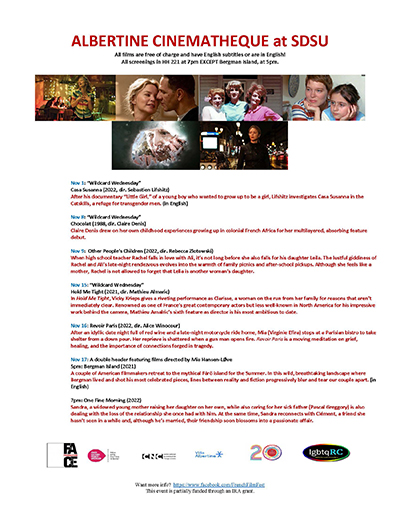 Albertine Cinematheque at SDSU
Albertine Cinematheque at SDSU
All films are free of charge and have English subtitles or are in English!
All screenings in HH 221 at 7pm EXCEPT Berman Island, at 5pm.
Nov 1: “Wildcard Wednesday!”
Casa Susanna (2022, dir. Sebastien Lifshitz)
After his documentary “Little Girl,” of a young boy who wanted to grow up to be a
girl, Lifshitz investigates Casa Susanna in the Catskills, a refuge for transgender
men. (in English)
Nov 8: “Wildcard Wednesday”
Chocolat (1988, dir. Claire Denis)
Claire Denis drew on her own childhood experiences growing up in colonial French Africa
for her multilayered, absorbing feature debut.
Nov 9: Other People’s Children (2022, dir. Rebecca Zlotowski
When high school teacher Rachel falls in love with Ali, it’s not long before she also falls for his daughter Leila. The lustful giddiness of Rachel and Ali’s late-night rendezvous evolves into the warmth of family picnics and after-school pickups. Although she feels like a mother, Rachel is not allowed to forget that Lelia is another woman’s daughter.
Nov 15 “Wildcard Wednesday”
Hold Me Tight (2021, dir. Mathieu Almaric)
In Hold Me Tight, Vicky Krieps gives a riveting performance as Clarisse, a woman on
the run from her family for reasons that aren’t immediately clear. Renowned as one
of France’s great contemporary actors but less well-known in North America for his
impressive work behind the camera, Mathieu Amalric’s sixth feature as director is
his most ambitious to date.
Nov 16: Revoir Paris (2022, dir. Alice Winocour)
After an idyllic date night full of red wine and a late-night motorcycle ride home, Mia (Virginie Efira) stops at a Parisian bistro to take shelter from a down pour. Her reprieve is shattered when a gun man opens fire. Revoir Paris is a moving meditation on grief, healing, and the importance of connections forged in tragedy.
Nov 17: A double header featuring films directed by Mia Hansen-LØve
5pm: Bergman Island (2021)
A couple of American filmmakers retreat to the mythical Fårö island for the Summer.
In this wild, breathtaking landscape where Bergman lived and shot his most celebrated
pieces, lines between reality and fiction progressively blur and tear our couple apart.
(in English)
7pm: One Fine Morning (2022)
Sandra, a widowed young mother raising her daughter on her own, while also caring
for her sick father (Pascal Greggory) is also dealing with the loss of the relationship
she once had with him. At the same time, Sandra reconnects with Clément, a friend
she hasn’t seen in a while and, although he’s married, their friendship soon blossoms
into a passionate affair.
Want more info? https://www.facebook.com/FrenchFilmFest
This event is partially funded through an IRA grant.
Coming-of-Age in Europe Series presents reading and discussion with Dorit Linke
Author of the novel “Beyond the Blue Border” (Jenseits der blauen Grenze)
November 7, 2023, 9:30-10:45 a.m.
SLHS 149
Free and Open to the Public
In the autumn of 1989, East Germany's communist regime crumbled under the pressure of peaceful protests, ultimately leading to the fall of the Berlin Wall. Yet, just a year prior, such change seemed unimaginable. Faced with the suffocating weight of the regime's oppression, the novel's teenage protagonists, Hanna and Andreas, decide to make a daring attempt to escape to the West by swimming across the Baltic Sea. Their harrowing journey involves evading patrol boats, battling turbulent waters, and maintaining enough strength to reach land on the other side. Along the way, they contemplate the dire conditions that have driven them to embark on this life-threatening adventure.
Dorit Linke is the author of four acclaimed novels for middle-grade and young-adult readers. Her debut work, “Beyond the Blue Border,” was nominated for the prestigious German Youth Book Award in 2015 and has since found its place on the stage and in school curricula. Beyond her role as a novelist, she dedicates her time to writing workshops at schools, aiming to engage students with the history and legacy of the GDR while fostering their dedication to democracy today. She developed an online reading platform that empowers authors to hold remote events with schools and libraries. In recognition of her remarkable contributions to education and democracy, in October 2023, Dorit Linke received the Order of Merit of the Federal Republic of Germany, the nation’s highest distinction.
This presentation is part of an interdisciplinary research cluster organized by Professor Lashon Daley (English and Comparative Literature) on "Global Renderings of Childhood and Its Literatures" funded through an IRC grant from the College of Arts and Letters.
Co-sponsored by the SDSU Children's Literature Program, the National Center for the Study of Children's Literature, the German Program, and the European Studies Department with IRA funds.
Coming-of-Age in Europe Series presents Amir Issa
“This Is What I Live For: An Afro-Italian Hip-Hop Memoir”
October 31, 2023, 2:00-3:15 p.m.
Gold Auditorium, Shiley BioScience Center
Born and raised in Rome to an Italian mother and an Egyptian father, Amir Issaa is an internationally renowned hip-hop artist who has creatively collaborated with many Italian and international artists over the decades. He is also a social activist and an educator, as part of his activist work, he regularly holds rap writing workshops in schools, prisons, and colleges across the world.
In 2017 Amir published his first book Vivo per questo, a personal and artistic autobiography that illustrates the challenges and dreams of the so called “second generation” in Italy (children born of immigrant parents). The book has now been translated in English and published as a bilingual Italian-English edition by SDSU Press as This Is What I Live For: An Afro-Italian Hip Hop Memoir.
Amir will present the book with some of the contributors from SDSU, Dr. Clarissa Clò and Jorge Hernandez (Italian and European Studies), and Dr. Roy Whitaker (Study of Religion), as well as Dr. William Nericcio, SDSU Press Director.
This presentation is part of an interdisciplinary research cluster organized by Professor Lashon Daley (English and Comparative Literature) on "Global Renderings of Childhood and Its Literatures" funded through an IRC grant from the College of Arts and Letters.
Co-sponsored by the SDSU Children's Literature Program, the National Center for the Study of Children's Literature, SDSU Press, the Italian Program and the European Studies Department with IRA funds.
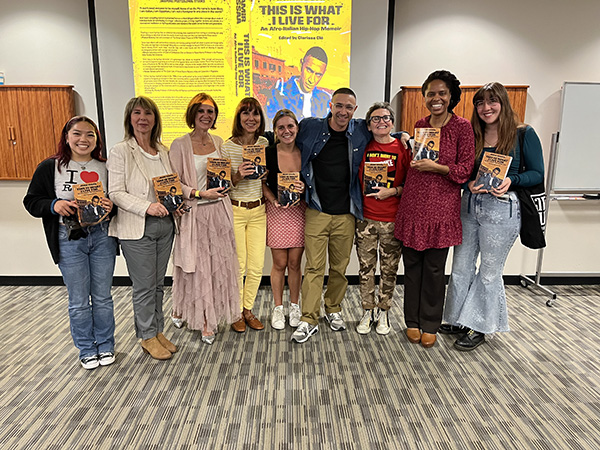
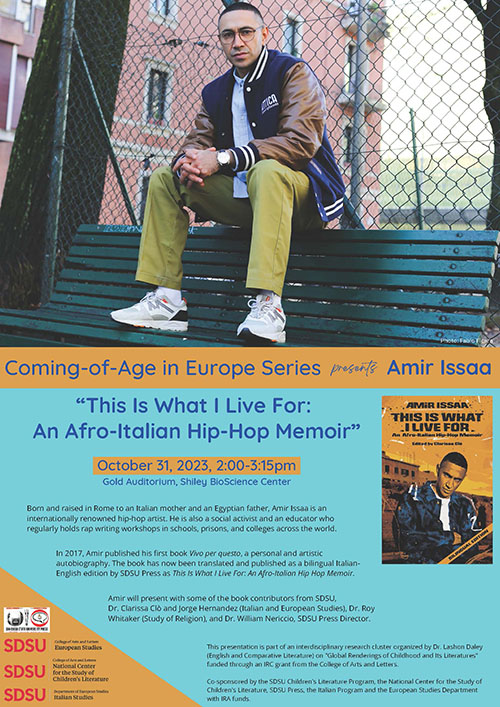
Imagine Europe: Europe Between Vengeance and Virtue - America’s Treatment of Enemies During and After WWII
A talk by Zachary Shore, Professor of History at the Naval Postgraduate School and Senior Fellow at the Institute of European Studies, University of California, Berkeley
Tuesday, May 2 | 12:30-1:45 p.m. | in Music 245
What kind of country is America? Some say it’s a racist nation. To others, it’s the
greatest country on earth. One way of examining America’s soul is by asking how it
treats its enemies. This talk explores the battles over whether to let the German
people starve in the early years of U.S. occupation. But the talk places these debates
over Germany in the larger context of vengeance by revisiting the internment of Japanese
Americans and the atomic bombings of Japan. It asks who really supported each of these
vengeful policies, and the answers will surprise you. Contrary to what we’ve been
told, in each case, most Americans, and most key officials, favored mercy over revenge.
But if that’s true, how, then, did those harsh policies get pushed through?
Vengeance is only one side of the story. Virtue is the other. This talk also examines
America’s attempts to atone for its wartime acts through postwar humanitarian campaigns
across Europe. Most people today have no idea that Americans once chose to go hungry
to help feed their former foes. By rescuing millions of migrants, minorities, and
average Europeans, the U.S. transformed its image in the eyes of the world. Yet even
those actions faced a backlash. This is the story of how a handful of leaders overcame
domestic resistance and mounted extraordinary efforts to save countless lives across
continents. To understand the U.S., we must grapple with all the good and bad, the
kindly and the cruel decisions, that produced the American century.
Sponsored by the Department of European Studies with CAL’s IRA funds and the Department
of History.
Albertine Cinematheque at SDSU
7 days, 7 films, all at 7 pm
All screenings in HH 221, except April 21 and 28 films screened in Bernstein Theatre
(formerly known as the Little Theatre)
All films are free of charge and have English subtitles.
Apr 19: France (2021, dir. Bruno Dumont)
Léa Seydoux brilliantly holds the center of Bruno Dumont’s unexpected, unsettling
new film, which starts out as a satire of the contemporary news media before steadily
spiraling out into something richer and darker. Never one to shy away from provoking
his viewers, Dumont (The Life of Jesus, NYFF35) casts Seydoux as France de Meurs,
a seemingly unflappable superstar TV journalist whose career, homelife, and psychological
stability are shaken after she carelessly drives into a young delivery man on a busy
Paris street. This accident triggers a series of self-reckonings, as well as a strange
romance that proves impossible to shake. A film that teases at redemption while refusing
to grant absolution, France is tragicomic and deliciously ambivalent—a very 21st-century
treatment of the difficulty of maintaining identity in a corrosive culture.
Apr 20: Benedetta (2021, dir. Paul Verhoeven)
Dr. Joanne Ferraro, Albert W. Johnson Distinguished Professor of History Emerita, will introduce the film.
Verhoeven’s sexually graphic, violent, often shocking film is based loosely on Judith
Brown’s Immodest Acts: The Life of a Lesbian Nun in Renaissance Italy (1985). Benedetta Carlini (1590–1661), an Italian nun in the Convent of the Mother
of God in Pescia, claimed she experienced mystic visions. As her fame spread, she
came to the attention of the Counter-Reformation papacy. That institution was seeking
to control potentially troublesome mystics who showed any signs of false claims or
heretical beliefs as did Benedetta. A series of investigations ensued to determine
the legitimacy of her claims. Unexpectedly, when they interrogated another sister,
Bartolomea, that they found that the two women had engaged in sexual relations. Benedetta
was stripped of her rank as abbess and remained in the convent prison until her death.
Apr 21: Happening (2021, dir. Audrey Diwan)
France, 1963, twelve years before abortion became legalized in France. Anne is a bright
young student with a promising future ahead of her. But when she falls pregnant, she
sees the opportunity to finish her studies and escape the constraints of her social
background disappearing. With her final exams fast approaching and her belly growing,
Anne resolves to act, even if she has to confront shame and pain, even if she must
risk prison to do so. This powerful, harrowing film is based on Nobel prize winner
Annie Ernaux’s autobiographical novel of the same name. NPR called it “timely and
urgent...a film that speaks to today’s abortion debate.”
Apr 26: We (2021, dir. Alice Diop)
The RER B is an urban train that traverses Paris and its environs from north to south.
A moving testament to the importance of filming as a process of bearing witness and
remembering, We is subtle and shrewd in a world which favors shortcuts and easy answers.
Justifiably adopting the fragmented structure of a patchwork portrait to describe
a riven society, Diop displays impressive control of her essay and its impact. In
the film’s first few minutes, a deer is observed, through binoculars. Isolation, discrimination,
and nostalgia for hierarchies, inherited from a monarchical past... Divisions haunt
France’s present. But the human urge to give as well as to receive stubbornly creeps
into every situation, observed or triggered. Could this be the one thing that still
keeps a nation together?
Apr 27: Gagarine (2021, dirs. Fanny Liatard & Jérémy Trouilh)
Youri, 16, has lived all his life in Gagarine Cité, a vast red brick housing project
on the outskirts of Paris. From the heights of his apartment, he dreams of becoming
an astronaut. But when plans to demolish his community’s home are leaked,Youri joins
the resistance. With his friends Diana and Houssam, he embarks on a mission to save
Gagarine, transforming the estate into his own “starship”–before it disappears into
space forever. The film was shot on the cusp of the actual demolition of the Cité
Gagarine housing project in collaboration with its residents in Ivry-sur-Seine.
Apr 28: Saint Omer (2022, dir. Alice Diop)
Technically, Saint Omer could be classified as a courtroom drama, but hardly in the
traditional sense. Rather than offering manipulated, melodramatic reversals, this
intense, stately work has the ring of classical tragedy – closer to Racine than 12 Angry Men. Named after the French town where it is set, Saint Omer is inspired by the 2016 trial of Fabienne Kabou, a young woman originally from Senegal,
charged with killing her baby daughter by leaving her on a beach. Diop attended the
trial, fascinated after reading about Kabou. “I went there under the magnetic pull
of an obsession that for a long time I couldn’t put into words. There was this psychoanalytic
and mythical dimension underlying the way she explained her actions. She said: ‘I
laid her on the sand, thinking the sea would carry her body away.’ That put the horror
of the crime to one side: I was hearing something else. I found myself making up a
story more beautiful, perhaps more acceptable than the real one, about a woman offering
her child to a sea which could care for her.”
May 3: Last Year at Marienbad (1961, dir. Alain Resnais)
Not just a defining work of the French New Wave but one of the great, lasting mysteries of modern art, Alain Resnais’ epochal Last Year at Marienbad (L’année dernière à Marienbad) has been puzzling appreciative viewers for decades. Written by radical master of the New Novel Alain Robbe-Grillet, this surreal fever dream, or nightmare, gorgeously fuses the past with the present in telling its ambiguous tale of a man and a woman (Giorgio Albertazzi and Delphine Seyrig) who may or may not have met a year ago, perhaps at the very same cathedral- like, mirror-filled château they now find themselves wandering. Unforgettable in both its confounding details (gilded ceilings, diabolical parlor games, a loaded gun) and haunting scope, Resnais’ investigation into the nature of memory is disturbing, romantic, and maybe even a ghost story.
Want more info? Visit us at https://www.facebook.com/FrenchFilmFest
This event is partially funded through an IRA grant.
Imagine Europe: Crossing the Borders and Challenging the Boundaries of White Feminism in Italy
A talk by Loredana Di Martino, Professor of Italian, University of San Diego
Thursday, March 23, 2023 | 12:30-1:45 p.m. | Gold Auditorium, Shiley BioScience Center
This talk will examine how white Italian feminists have begun to reckon with the colorblindness of their theories and are contributing to the development of a critical white feminism. Starting from key feminist texts from the 1970s, the presentation will move into more recent iterations of the so-called pensiero della differenza [philosophy of difference] that have critically reengaged with and redefined both Marxist theories of social reproduction and symbolic practices of female intersubjectivity. The discussion will consider the impact that local and international antiracist and intersectional feminisms have had in redefining white feminist imaginaries and stimulating the creation of a broader and more inclusive feminist struggle in Italy.
Loredana Di Martino is Professor of Italian Studies at the University of San Diego.
Her current research focuses on the intersections between Italian literature, gender
studies, and postcolonial and transnational studies. She investigates the relationship
between contemporary storytelling and feminist and anti-racist activism as well as
transnational feminist practices in Italy. Her most recent articles focus on Elena
Ferrante’s feminist philosophy, and the recent decolonial turn in Italian feminism.
She is working on a book project on contemporary transnational and intersectional
articulations of the so-called Italian philosophy of difference. Her publications
include peer-reviewed articles, book chapters and encyclopedia entries in addition
to the co-edited volume Encounters with the Real in Contemporary Italian Literature
and Cinema (2017) and the single-authored book Il caleidoscopio della scrittura. James
Joyce, Carlo Emilio Gadda e il romanzo modernista (2009).
Sponsored by the Department of European Studies, the Department of Women's Studies
and the Italian Program with CAL’s IRA funds.
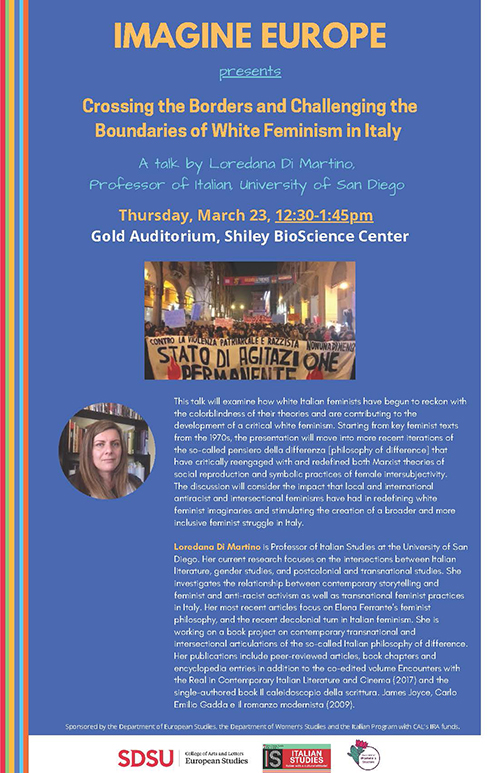
Imagine Europe: Black Italians and Cultural Entrepreneurship in Film, Fiction, Music, and Social Media
Antonio Dikele Distefano in conversation with Fred Kuwornu
Tuesday, February 7, 2023 | 12:30-1:45 p.m. | Montezuma Hall
Antonio Dikele Distefano is an Italian writer, producer and filmmaker of Angolan descent, author of five successful young adult novels with combined sales exceeding 500,000 copies. He is the co-creator of the 2021 Netflix series Zero, and the director of the 2022 Amazon Prime film Autumn Beat, both featuring young Black Italian protagonists. An inspiration to many Black Italians, he has pioneered numerous projects in publishing, television, and social media. In 2016 he founded Esse Magazine – the largest and most influential rap publication in Italy today – to showcase Black artists and performers. He owns the communication agency Cantera. With his production company he is developing films that bring Black Italian performers onto the world stage. His mission is to produce quality projects that positively portray underserved communities.
Fred Kudjo Kuwornu is an Italian filmmaker and producer of Ghanaian descent based in New York. He is the director of Blaxploitalian 100 Years of Blackness in Italian Cinema (2016), 18 IUS SOLI (2011), on the racial prejudices of the Italian citizenship law, and Inside Buffalo (2010), on the 92nd Infantry Division and the contribution of African American soldiers during WWII. He started his film career in 2008 as a production assistant on the set of the film Miracle at St. Anna directed by Spike Lee.
Event organized in collaboration with the Italian Cultural Institute of Los Angeles and co-sponsored with IRA funds from the College of Arts and Letters.
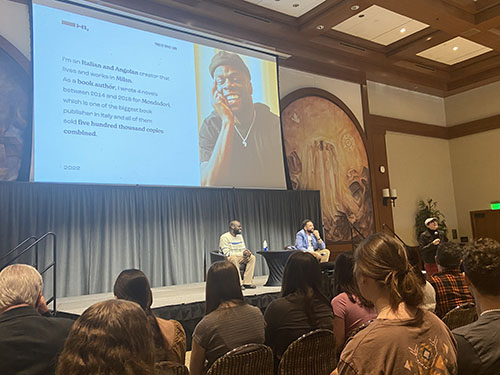
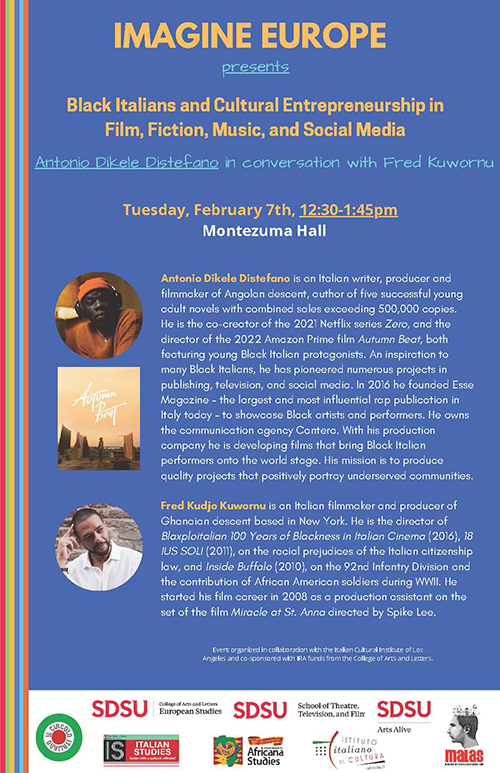
Imagine Euorpe Presents Jose Alaniz
National Precarity in Post-Soviet Eurasian Comics
Tuesday, Nov. 15, 2022 | 12:30-1:45 p.m. | Gold Auditorium, Shiley Bioscience Center
Provided via Zoom as well.
Jose Alaniz is a professor in the Department of Slavic Languages and Literatures and the Department of Cinema and Media Studies at the University of Washington, Seattle. Dr. Alaniz has published three monographs, Komiks: Comic Art in Russia (2010); Death, Disability and the Superhero: The Silver Age and Beyond (2014); and Resurrection: Comics in Post-Soviet Russia (2022). He was a founding board member of the Comics Studies Society and his current book projects include Comics of the Anthropocene: Graphic Narrative at the End of Nature. In 2020 he published his first comics collection, The Phantom Zone and Other Stories (Amati Comix). He lives blissfully with his wife and 25 animals in rural Washington state.
Co-sponsored by the Department of European Studies, the Center for European Studies, the European Studies program with CAL IRA funds, Department of History, SDSU Comics, the Center for War and Society and the SDSU Press.
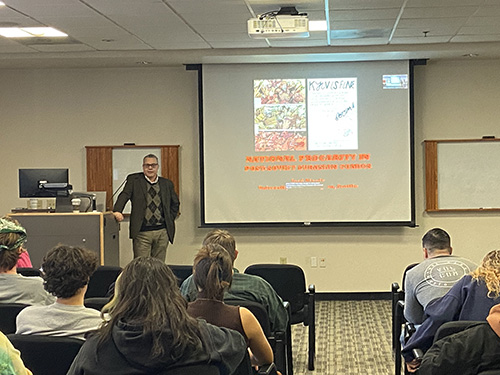
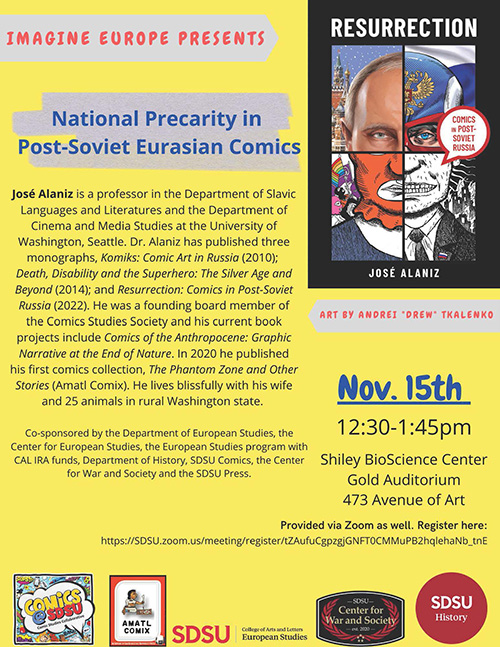
Imagine Europe and Humanities in Action present
A reading and discussion with German novelist Bernhard Schlink
Monday, Oct. 24, 2022 | 11-11:50 a.m. | Scripps Cottage, SDSU
Free and open to the public.
Internationally acclaimed novelist Bernhard Schlink will read from his latest novel, "Olga." This 2018 novel, first translated into English in 2020, tells the story of two unlikely lovers, Herbert and Olga, who are swept up in the turbulence of the twentieth century. Narrated from Olga’s perspective, the novel portrays major events in European history, including colonialism in Africa; displacement and expulsion from Eastern Europe in the 1940s; and the student movement in 1968. Alida Becker, writing in the New York Times, describes Olga as being “caught between worlds”: “A quietly determined German schoolteacher,” Olga is “a survivor of two world wars” who spends “a lifetime waiting for a lover who may never return.”
Bernhard Schlink’s background as a legal scholar and former constitutional court justice informs the clarity and incisiveness of his poetic language, as well as the moral questions he raises in his fiction. Professor Schlink taught law and legal philosophy at the Humboldt University in Berlin and at the Benjamin N. Cardoza School of Law in New York City. In addition to his scholarly writings, he has authored over ten novels and short story collections, beginning with the 1987 co-authored crime novel "Selbs Justiz," translated into English as "Self’s Punishment." He is best known for his 1995 novel "The Reader," a story of love and secrets, horror and compassion, unfolding against the haunted landscape of postwar Germany. It became the first German novel to reach #1 on the New York Times bestseller list. The 2008 film adaptation, directed by Stephen Daldry, was nominated for five Academy Awards and starred Ralph Fiennes and Kate Winslet, who won the Academy Award for Best Actress.
The event is co-sponsored by the Departments of European Studies and English and Comparative Literature and received funding from IRA, the Center for European Studies, Humanities in Action, CAL’s Dean’s Office, and Adventures by the Book.
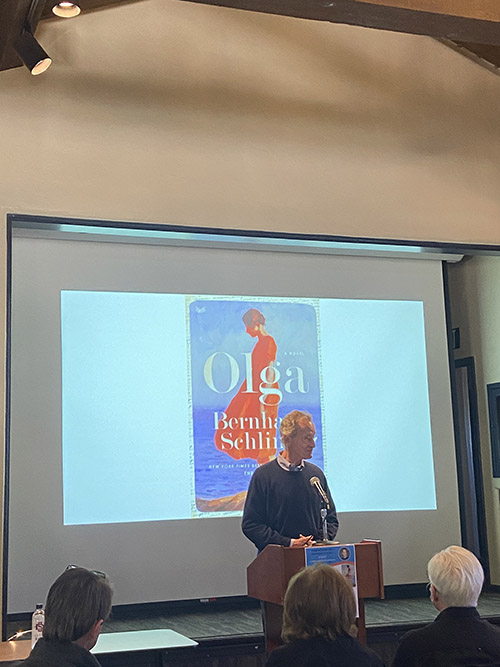
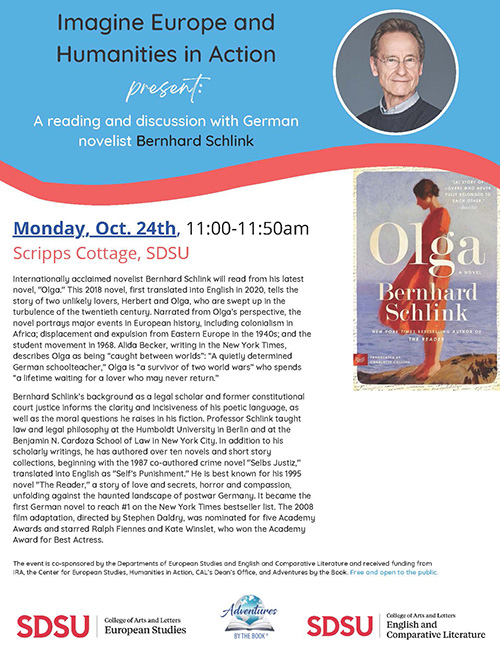
Imagine Europe
EmbarRACEments: African Diaspora and Afrophobia in Italy
Thursday, September 29, 2022
12:30-1:45 p.m.
Donald P. Shiley BioScience Center, Gold Auditorium, SDSU
While Italians supported the Black Lives Matter movement that was born in the United States, many remain blind to the rampant racism in their own society. In Italy there is excessive fear and great aversion to Africans, a condition which the UN and EU refer to as “Afrophobia.” This is a systemic, endemic phenomenon with multiple origins that contributes to a negative representation and perception of Africa. This view is at the root of racism in Italy, a racism that often expresses itself in the banality of people’s everyday language, micro-aggressions, and hypersexualized approaches toward women.
This presentation includes readings from Kossi Komla-Ebri’s two volumes of personal, ironically humorous anecdotes, translated in English as EmbarRACEments: Daily Embarrassments in Black and White . . . and Color (2019), focusing on issues of inclusivity, racism, and cultural conflict. EmbarRACEments tells the embarrassment of difference, the discomfort related to the Other, the culturally different, and, especially, the visibly different.
Kossi A. Komla-Ebri, born in Togo, is a medical surgeon and award-winning writer who lives near Como, Italy. His publications include Neyla (2002, 2019), translated and published in the USA, his volumes of anecdotes, Imbarazzismi, and Nuovi Imbarazzismi, translated into English (EmbarRACEments 2019), French (Embarracismes-Le racisme au quotidien, 2016) and Arabic (2021). He has recently published two books of fables, Gente udite la mia favola and Le due lezioni (2022), and a collection of short stories Avant que tombe la nuit (2021). The English translation of eleven short stories was published as Home by Bordighera Press in 2022.
He has been invited to speak at numerous conferences in Italy and internationally and has presented at university courses on issues related to Africa, black Italy, integration, interculturalism and migration literature.
Sponsored by the the Department of European Studies, the Center for European Studies, the Italian Program and the Department of Africana Studies with CAL's IRA funds.
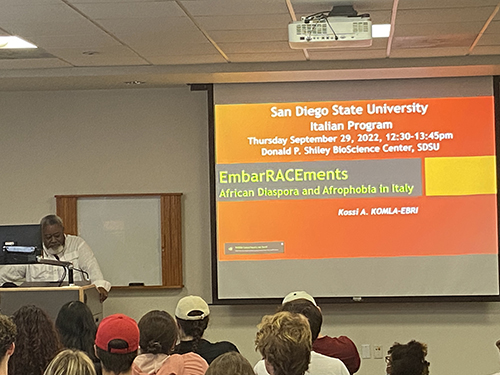
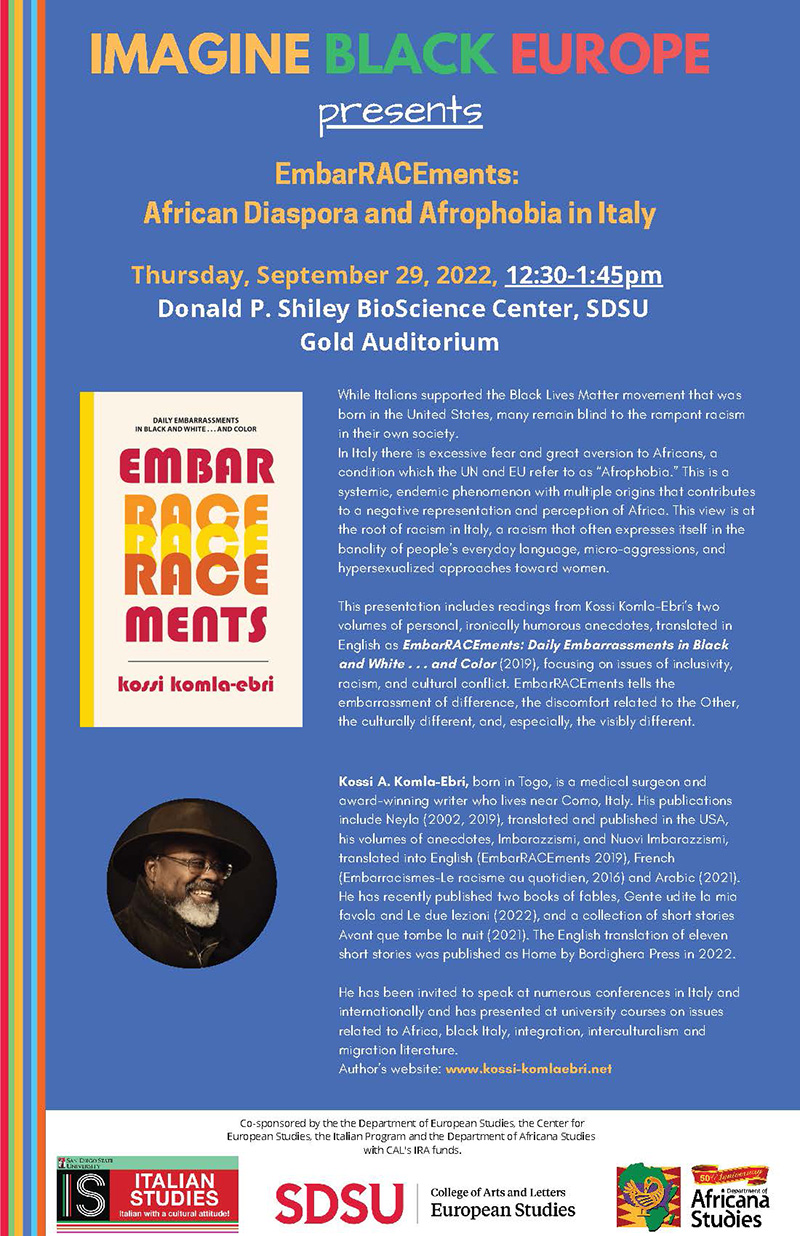
On Marginalization and the Limits of European Belonging
with Dr. Sunnie Rucker-Chang
Tuesday, Sept. 27th, 9:30-10:45am
Templo Mayor, SDSU, Aztec Student Union, Level 2
In this presentation Dr. Rucker-Chang will challenge the seemingly inclusive nature of “Europe” and “European” while recognizing these concepts as limited and inflexible. She will do so by discussing how articulations and expressions of “Europeanism” exclude marginalized communities and geographical peripheries on the European continent. The conversation will center on contemporary constructions non-EU, post-conflict, Southeast European countries, with an emphasis on Serbia, and negatively racialized populations that are regularly defined by way of their difference and distance from the majorities of their countries of residence.
Sunnie Rucker-Chang is an Associate Professor in the Slavic and East European Languages and Cultures and African American and African Studies departments at the Ohio State University. She is also the co-director of the Russian, East European and Eurasian Studies (R.E.E.E.S) Undergraduate Think Tank at Howard University. She writes on culture, marginalization, and media in Southeast Europe.
Sponsored by the Department of European Studies lecture series "Imagine Europe," the Center for European Studies and the European Studies program with CAL IRA funds, the History Department IRA for the lecture series "Refugees, Migrants, Minorities, and War in Modern Europe and Beyond” and the SDSU Center for Human Rights
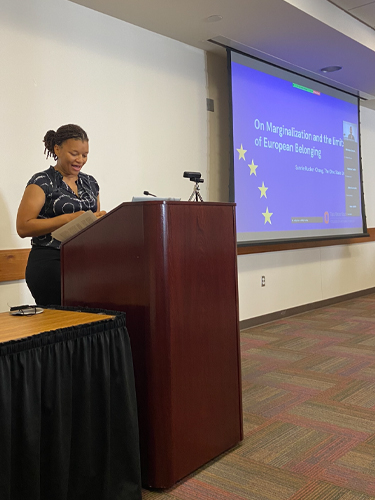
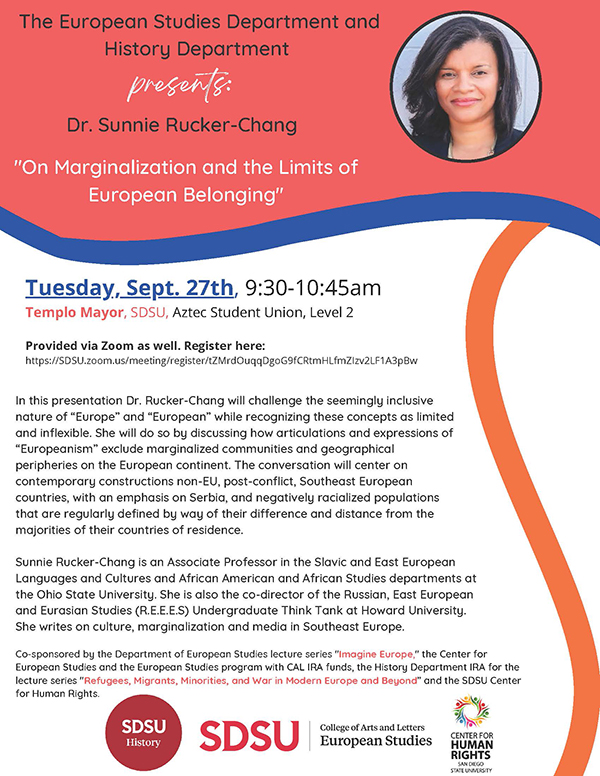
Solidarity with the People of Urkraine Concert
with Alex Kiskachi and Leo Chelyapov
May 5, 2022
6 pm
in Physics Building P244
Please join the Russian Program for a free concert by Alex Kiskachi Band to show solidarity with Ukraine!
Alex Kiskachi is a San Diego-based musician, singer, and songwriter. Originally from Moscow, Russia, he is well known far beyond the Southern California scene, where he regularly performs with his band or solo unplugged. Alex’s music fuses the gloom yet self-irony and raunchiness of blues, the drive, and madcapping of rock-n-roll, the pure emotion of Latin rhythms. His lyrics are deeply metaphorical and filled with wordplay and symbolism, yet follow the best traditions of Russian poetic heritage. His musical influences encompass a wide range of seemingly eclectic sources: from the early 20th-century Russian chansonnier Alexander Vertinsky to legendary Russian rock bands Aquarium and Auktyon, from Paul Simon to Tom Waits.
Many outstanding musicians have played and currently play in Alex Kiskachi's band. This time, he is joined by Leo Chelyapov, a well-known saxophone and clarinet player and a former member of legendary Russian rock bands “Brigada S” and “Bravo.” He is currently the leader of the Los Angeles-based klezmer orchestra “Kings of Klezmer.”
Alex Kiskachi’s albums: "Chronicle" and "Unfaithful Syncopations." Currently working on the third, yet unnamed, album.
Alex Kiskachi’s website | More songs
Co-sponsored by the SDSU Department of European Studies and the Center for European Studies with CAL IRA funds.
The Théâtre Français de SDSU presents
Fort Gambo
April 29 and 30, 2022
7:30 pm
at Scripps Cottage
A modern western by Marie Redonnet. Murders, smuggling, and young lovers all collide
in the border town of Fort Gambo.
In French with English synopsis provided.
Admission: FREE!
Production financed by European Studies, IRA Funding and Le Cercle français
Imagine Europe Presents
Ukraine: Voices from Kyiv
March 17, 2022, at 9:30 am
Attend live in Storm Hall 123 or Join via Zoom
Check out the event recording.
Taras Mazyar and his family will join us via Zoom to discuss their experience living under siege in Kyiv, including helping countrymates with evacuation efforts.
Taras Mazyar earned an M.A. degree from the University of Notre Dame. He interned at the Ukrainian Ministry of Foreign Affairs Department of the European Union and worked as an assistant to the Chairman of the Parliamentary Committee for Foreign Affairs researching issues of human rights protection, migration, minority rights and WTO-related issues. Additionally, he worked at the Pylyp Orlyk Institute for Democracy, dealing with issues of democracy-building in Ukraine.
Organized by Zamira Abman, Director and Undergraduate Advisor, Comparative and International Studies and Emily Schuckman-Matthews, Director of European Studies and Associate Professor
Co-sponsored by the SDSU Department of European Studies, the Center for European Studies, and the Italian program with CAL IRA funds.
French and Francophone Film Festival 2022
Albertine Cinematheque at SDSU
March 17
- 7pm. 35 Shots of Rum (2009, dir. Claire Denis)
March 19
- 5pm. Story of a Three Day Pass (1967, dir. Melvin Van Peebles)
- 7pm. Night of the Kings (2020) dir. Philippe Lacote)
April 7
- 7pm. A Dramatic Film (2019, dir. Eric Baudelaire)
April 8
- 5pm. Slalom (2020, dir. Charlène Favier)
- 7pm. Little Girl (2020, dir. Sébastien Lifshitz)
All films screen in LT 161 and are free of charge and have English subtitles.
More info at https://www.facebook.com/FrenchFilmFest
Imagine Black Europe Presents: Tiffany N. Florvil
Black German Women and Intellectual Activism
Thursday, March 10 | 12:30-1:45 pm
Location: Peterson Gym 153
In 1985, Black German men and women united and created a diasporic movement that connected people from across the nation. But Black women were key figures in the movement who helped to determine its cultural, political, and intellectual contours. Specifically, Dr. Florvil examines May Ayim and Ricky Reiser as examples of what she has coined “quotidian intellectuals,” intellectuals who stress the everyday in form and content. These two women, she argues, decolonized German knowledge in ways that made the Black diaspora and Black Germanness legible. Through their intellectual work, these Black German women also made significant epistemic interventions that allowed them to write themselves into German and diasporic history.
Tiffany N. Florvil is an Associate Professor of 20th-century European Women’s and Gender History at the University of New Mexico. She specializes in the histories of post-1945 Europe, the African diaspora, Black internationalism, as well as gender and sexuality. Her award-winning manuscript, Mobilizing Black Germany: Afro-German Women and the Making of a Transnational Movement (University of Illinois Press 2020), offers the first full-length study of the history of the Black German movement of the 1980s to the 2000s.
If you are unable to attend in-person and would like to join virtually, please register for the link.
Sponsored by the Department of European Studies with CAL IRA funds, the Center for
European Studies, the Department of History, Africana Studies and the Institute for
Ethics and Public Affairs (IEPA).
Russia's War Against Ukraine: A Historical and Contemporary Perspective
Wednesday, March 9 | 4-5:30 pm
Location: Music, Room 120
Free and open to the public.
- What are the origins of the Russia-Ukraine war?
- Why has Putin invaded Ukraine?
- What is the war’s global implications?
- How will this end?
Join SDSU Professors Mikhail Alexseev (Political Science) and Pierre Asselin (History) for the latest and most pertinent insights on these and related issues. Professors Emily Schuckman Matthews (European Studies) and Daria Shembel (Russian Studies) will provide commentaries. Moderated by Director of SDSU’s Center for Human Rights Grace Cheng.
Sponsored by the Dwight E. Stanford Endowment, Center for Human Rights, Center for War & Society/USS Midway Endowment, International Security and Conflict Resolution (ISCOR), and Departments of History and Political Science.
Contact Professor Pierre Asselin at [email protected] for more information.
Exoticism, Eroticism, and Harem Culture: Gender Issues in 19th and Early 20th Century German Orientalism
Thursday, February 17 | 9:30-10:45 am
Lecture by Melda Baysal Walsh, Ph.D.
Arabian nights, Eastern women, the harem, exoticism, anderoticism: what else comes to mind when thinking of thecolorful world of the Orient? In order to challenge theseWestern stereotypes, which have been abundant sincethe Middle Ages and reflect only a few of the manyprejudices contained in the Western understanding of“Orientalism”, Dr. Walsh’s research examines culturalrepresentations of "oriental", African and occidentalwomen in literary texts by nineteenth- and earlytwentieth-century German and Austrian writers (Hugo vonHofmannsthal, Ida Hahn-Hahn, Peter Altenberg, ElseLasker-Schüler) as well as in the visual arts.
Sponsored by IRA funds.
Virtual Book Talk
Monday, 12/6 | 12 - 1 PM PST
Virtual DH book talk featuring Andrea Righi (Associate Professor of Italian Studies
at Miami University of Ohio).
Join us to discuss his latest book, The Other Side of the Digital: The Sacrificial Economy of New Media (University of Minnesota, 2021), a necessary, rich new examination of how the wired world affects our humanity. Andrea Righi deconstructs contradictions inherent in our digital world, examining how ideas of knowledge, desire, writing, temporality, and the woman are being reconfigured by our sacrificial economy. The Other Side of the Digital provides a necessary, in-depth cultural analysis of how the political theology of the new media functions under neoliberalism.
The talk will be of interest to anyone curious about how our self-image and perception of reality are skewed by technologies like fitness brands, matchmaking apps, and search engines, among others.
This event is sponsored by the Digital Humanities Initiative, the Italian Program,
and the Department of European Studies with CAL's IRA funds.
Art Across the Lines: A Panel on Voyage of the St. Louis
Join us for a discussion of San Diego-based Red Car Press’s new graphic novel, Voyage of the St. Louis, exploring the medium of comics, and the intersection of graphic novel and storytelling across borders.
Tuesday, November 16 | 11 a.m. | Digital Humanities Center, SDSU Love Library (LA 61)
Panelists:
- Antony Shugaar (Translator and Red Car Press)
- Alonso Nunez (Little Fish Comic Book Studio)
- Antonio Iannotta (Artistic Director, SDIFF)
Moderator: Elizabeth Pollard (Professor of History and Comics@SDSU)
About Voyage of the St. Louis – Courage on the High Seas, by Sara Dellabella and Alessio Lo Manto
On May 13, 1939, the German transatlantic liner St. Louis set sail from Hamburg. Its destination is Cuba. There are 937 Jews on board, fleeing the growing Nazi threat. The German captain, Gustav Schröder, is forced to steam back to Europe, after both Cuba and the United States governments refuse to help the passengers. Hopes are raised for placement with the host nations of Belgium, Great Britain, Holland, and France. As Nazi Germany prepares to invade Europe, the epilogue is a devastating one for many aboard the St. Louis. (The graphic novel was originally published in Italy by Round Robin).
Co-sponsored with CAL's IRA funds by the Italian Studies Program, the Department of European Studies, the Center for European Studies, Comics@SDSU, the San Diego Italian Film Festival, Red Car Press, and Little Fish Comic Book Studio)
"Translating Afro-Italian Blackness, Considering Gender"
A conversation with Barbara Ofosu-Somuah and Candice Whitney co-translators of Future. Il domani narrato dalle voci di oggi (Futures. Tomorrow Narrated by the Voices of Today), the first literary anthology by black Italian womxn, edited by Igiaba Scego.
Thursday October 21, 2021 at 11 on Zoom.
Co-sponsored by the Italian Program, the Department of European Studies, the Center for European Studies, the Department of Africana Studies and the Department of Women's Studies with CAL's IRA funds.
Candice Whitney is a researcher, writer, and international education professional, based in New Jersey. In 2016–17, as a Fulbright Scholar, she conducted research that explored how the diversity of African women’s entrepreneurial projects interrogates and challenges stereotypes about the African diaspora in Italy. She’s also the co-curator and cohost of the Virtual Salons: Discourses on Black Italia webinar series at NYU’s Casa Italiana Zerilli-Marimò. Whitney received her bachelor of arts in anthropology and Italian from Mount Holyoke College.
Barbara Ofosu-Somuah is a researcher, writer, and emerging Italian-to-English translator, from Accra,
Ghana, and the Bronx, New York. As a translator, she attempts to bring the works of
contemporary Afro-Italian writers to English-speaking audiences. She has received
both Thomas J. Watson and Fulbright research fellowships to investigate the racialized
lived experiences of Black people, primarily women, across the African diaspora. During
her Fulbright year, Barbara collaborated with various Black Italian organizations/collectives
as they unpacked the reality of concurrently embodying Blackness and Italianness in
a culture that perceives both identities as incompatible. Ofosu-Somuah has a bachelor
of arts in sociology, psychology, and Italian, from Middlebury College.
Film Screening: Baci rubati (Stolen Kisses, 2020)
On LGBT identities, struggles and survival in Fascist Italy.
In Italian with English subtitles.
October 14-16
Streamed online starting at 6 p.m.
(FREE when you select "buy ticket" and enter Code: SDSUBACI21)
October 17
Live Q&A discussion at 11 a.m. with directors Fabrizio Laurenti and Gabriella Romano
Sponsored by the San Diego Italian Film Festival, SDSU Italian Program, the Department of European Studies, the Center for European Studies and SDSULGBTQ+ Studies Program with CAL's IRA funds.
Our Spring 2021 Imagine Europe Series
Friday, April 30th & Saturday, May 1st at 7pm
Join us for Le Théâtre français de SDSU's Zoom production of "Feu la mère de Madame." There will be an introduction in English before the play begins and a live Q&A session with the virtual set design team at the end.
French Play Synopsis:
Lucien, who has finally made it home at 4am after a wild Parisian masquerade party, rings the doorbell repeatedly and finally wakes up his wife Yvonne, who, understandably irritated, starts to read him the riot act. (This is absolutely not the night to have forgotten the house keys!) But at the moment the two are about to get to bed, a servant rings with bad news: "Madame's" mother has died. Yvonne collapses, while Lucien's post-party state is barely up to it: with all the rich food and alcohol he's feeling a bit nauseous -- even Annette, their Alsatian maid cannot fix this one.
When a play starts out on that note, we know Feydeau is going to throw more surprises our way in this vaudeville comedy with a hilarious twist.
A Lecture by Stephanie Jed, Professor of Italian and Comparative Literature, University of California, San Diego
Thursday, April 22 at 11am
In honor of the 700th anniversary of Dante’s death, we will explore Dante’s Inferno as a roadmap for understanding how we might, in today’s world, strengthen our communities and relations of justice through responsible reading and thinking.
Co-sponsored by the Italian Studies Program, the Department of European Studies, the Center for European Studies, the College of Arts and Letters and the Italian Institute of Culture in Los Angeles.
April 4-24, 2021
Presented in collaboration with the Department of European Studies, the Center for European Studies, the LGBTQ Research Consortium and FACE Council.
All films streamed for free and with English subtitles. Click on film title below for more information.
Dir. David Lapid 2019 / 123 min.
Trailer: https://www.youtube.com/watch?v=9u1HtImIb6s
With Synonyms, Israeli director/writer David Lapid turned to his own experience as a young exile in France twenty years ago to tell the story of Yoav, a young Israeli who arrives in Paris knowing no one and barely speaking French but committed to forgetting his homeland and becoming a Frenchman.
Dir. Christophe Honoré 2019 / 86 min.
Trailer: https://www.youtube.com/watch?v=LYqtx3vyONg
With this fanciful notion of a mature woman taking stock of her life through encounters with her ghosts, leading French auteur Christophe Honoré sends a love letter to cinema, and a singular tribute to a wonderful actress, Chiara Mastroianni.
Dir. Djbril Diop Mamberty 1992/ 110 min.
Trailer: https://www.youtube.com/watch?v=FqO9FFwIAGA
Djibril Diop Mambéty adapted Swiss dramatist Durrenmatt’s The Visit, setting this universal tale of revenge and moral corruption in an African context, balancing references to folklore, parallels between humans and animals, and an astute sense of Senegal and the African continent’s place in the global economic order. This restoration underscores masterpiece’s enduring relevance.
Dir. Bruno Dumont 2019 / 138 min.
Trailer: https://www.youtube.com/watch?v=GCGkZ92cpcg
Dumont, predictable only in his unpredictability, keeps us on our toes by casting ten-year-old Lise Leplat-Prudhomme, who played young Joan in the first film, in the role of mature Joan. Her steely performance conveys an otherworldly resilience that gives Joan’s spirituality a concrete presence, suggesting a bold new approach to this oft-told tale.
Dir. Agnès Varda 2019 / 120 min.
Trailer: https://www.youtube.com/watch?v=n37iq8cCDH0
As anyone who has ever seen an Agnès Varda movie knows, Varda would not simply be satisfied with retreading her accomplishments: this is a film as open to the future as it is to the past, full of insight and inspiration for young filmmakers, artists, and thinkers, and imbued with Varda’s incomparable swiftness of thought and warmth of feeling.
Dir. Céline Sciamma 2019 / 122 min.
Trailer: https://www.youtube.com/watch?v=R-fQPTwma9o
Sciamma’s art has rarely been more delightful to behold than in the way she teases out the shift from the artist’s dispassionate gaze to the yearning admirer’s look of desire. As the two young women experience a brief burst of love and freedom, that will remain with them for the rest of their lives, Sciamma challenges the viewer to guess who is looking at who, raising complicated questions not only about desire but the history of artists and their models.
Santanu Das is Professor of Modern Literature and Culture and Senior Research Fellow at All Souls College, University of Oxford. He is the author of Touch and Intimacy in First World War Literature (2006) and the editor of Race, Empire and First World War Writing (2012). His latest book India, Empire and First World War Culture: Writings, Images, and Songs (Cambridge, 2018) was awarded the Hindu Literary Prize for Non-Fiction in India and the European Society for the Study of English Book Prize in 2020.
Cosponsored by: The Center for European Studies, The European Studies Program, the Department of European Studies and the Department of History
20th Anniversary Celebration
The Department of European Studies celebrates 20 years at SDSU!
Spring 2020 Imagine Europe Series
Skins, Lines, Borders: Geographic Expertise and the Mapping of Eastern Europe in 1919.
Wednesday, February 5
Featuring: Steven Seegel, University of Northern Colorado
Sponsored by the Center for European Studies, the European Studies Department, European Studies Program and the Geography Dept. Made possible by IRA funds from CAL.
Remembering Reconciliation: Polish-German Relations in the Media after 1945.
Thursday, February 27
Featuring: Dr. Annika Frieberg, SDSU
Sponsored by the Center for European Studies, the European Studies Department, and the European Studies Program. Made possible by IRA funds from CAL.
Asylum After Empire: Colonial Legacies in the Politics of Asylum Seeking
Thursday, March 5
Featuring: Lucy Mayblin: Senior Lecturer in Sociology, University of Sheffield
Asylum seekers are not welcome in Europe. But why is that the case? For many scholars, the policies have become more restrictive over recent decades because the asylum seekers have changed. This talk, based on Mayblin's book Asylum After Empire, draws on theoretical insights from Third World Approaches to International Law, post- and decolonial studies, and presents archival research on the colonial context to the Geneva Convention negotiations. Policies which address asylum seekers must, the book argues, be understood not only as part of a global hypermobile present, but within the context of colonial histories.
Sponsored by the European Studies Dept, European Studies Program, Italian Program,
ISCOR, Dept of Philosophy, Dept of Sociology, Dept of Political Science and made possible
by an IRA award from the College of Arts and Letters.
2019 French Language Conference & Job Fair
Parlez-vous français?
Tuesday, November 19
Make French one of your professional assets!
French language is a highly valued and competitive advantage at any stage of your career or studies. Discover companies and network with professionals who will share their expertise in how French opens new doors and possibilities.
- One-on-one Meetings: Meet directly with companies seeking to hire French speakers
- Workshops: Tailor your CV and cover letter, learn how to prepare for interviews
- Debates and Roundtables: Learn about the importance of French for domestic and international job markets
Imagine Europe
Join us for the event series, Imagine Europe, which represents the variety and uniqueness of European Studies.
These events are sponsored by the Center for European Studies.
Roots and Legacy of Italian Feminism (English)
Il canto V di Dante e l'eccessiva forza dell'amore (Italian)
Tuesday, February 26
Two lectures by Andrea Righi (Associate Professor, Miami University of Ohio), co-author with Cesare Casarino of Another Mother: Diotima and the Symbolic Order (University of Minnesota Press, 2018).
Co-sponsored with the Italian Program and Department of Women's Studies, and made possible by an IRA award from the College of Arts and Letters.
Cinderella Today: Rewriting, Adapting, and Translating a Classic Fairy Tale
Monday, March 4
Presented by the European Studies Department, in partnership with the College of Arts and Letters, the National Center for the Study of Children’s Literature, English and Comparative Literature Department and the student org - Le Cercle Français/French Club
Program:
Joseph Thomas , “Cinderellas, Cinder Sluts, and Ashen Heaps, or Translation as Adaptation
and Adaptation as Translation”
Audrey Coussy, “Translating All the Ever Afters in French – Recreating Cinderella and Early Modern England in the 21st Century”
Danielle Teller, author of All the Ever Afters. The Untold Story of Cinderella’s Stepmother, in conversation with her translator.
Songs of Memory and Resistance: Gabriella Ghermandi's Italian-Ethiopian Storytelling
Tuesday, March 5
Italian-Ethiopian author and performer Gabriella Ghermandi will discuss her multifaceted work as writer, singer and storyteller. She is the author of the acclaimed novel Queen of Flowers and Pearls, a marvelous voyage in time and space intertwining multiple stories of resistance from the age of Italian colonialism to contemporary migrations. Originally published in Italian in 2007, it was translated in English in 2015 and in Amharic in 2017.
Gabriella Ghermandi was born in Addis Ababa, Ethiopia, her mother's land, and lived there until the late 1970s when she was forced to relocate to Bologna, her father's hometown in Italy, where she still lives. She uses storytelling and live performance to reach diverse audiences and foster mutual empathy. She is also the creator and lead singer of The Atse Tewodros Project, an artistic collaboration between Ethiopian and Italian musicians.
Co-sponsored with Circolo italiano, the European Studies Program, Dept. of European
Studies, Dept. of Africana Studies, Dept. of Women's Studies, Interdisciplinary Human
Rights Initiative, The Center for European Studies, and Common Experience: Time.
French and Francophone Film Festival 2019
March 7, 8, 9 & 14, 15, 16
San Diego State University
Free admission - all films screened with English subtitles.
Presented in collaboration with the Department of European Studies, the Center for European Studies, and the LGBTQ Research Consortium and FACE Council.
Support for the Tournees Festival is provided by The French Ministry of Foreign and
European Affairs/ The Centre National de la Cinematographie The Florence Gould Foundation/
The Grand Marnier Foundation/ highbrow entertainment.
A Talk by Elif Shafak
Tuesday, April 9
Award-winning Turkish contemporary literary voice Elif Shafak will discuss Three Daughters of Eve, her new novel about an unexpected friendship between three Muslim women from very different cultural backgrounds who meet while studying at Oxford University.
Co-sponsored with the European Studies Program, Department of Women’s Studies, CAL
(Dean’s support fund) and Instructionally Related Activities.
Salaam-Shalom: Building Alliances Against Antisemitism and Islamophobia in Europe
Tuesday, April 30
Activist and founder of Salaam-Shalom, Ármin Langer, will speak about the efforts of the initiative to promote a peaceful coexistence of Jews, Muslims and their allies in Europe.
Co-sponsored with German Studies, Department of European Studies, Department of Political Science, ISCOR, Center for Islamic and Arabic Studies, and CAL's IRA funds.
6th Annual World Languages Symposium
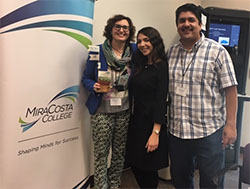 Dr. Clarissa Clò (Italian Studies, Chair of European Studies) delivered the keynote
speech at the 6th Annual World Languages Symposium sponsored by the North County Higher Education Alliance, hosted by MiraCosta College
(San Elijo Campus) on October 26, 2018. Her presentation was entitled "High-Impact Pedagogies in Foreign Language Education." Accompanying her were two student presenters: Mariana Barrios and Jorge Hernandez.
Dr. Clarissa Clò (Italian Studies, Chair of European Studies) delivered the keynote
speech at the 6th Annual World Languages Symposium sponsored by the North County Higher Education Alliance, hosted by MiraCosta College
(San Elijo Campus) on October 26, 2018. Her presentation was entitled "High-Impact Pedagogies in Foreign Language Education." Accompanying her were two student presenters: Mariana Barrios and Jorge Hernandez.
Commencement 2018
The College of Arts and Letter 2018 Commencement will be on Friday, May 11th at 10 a.m. in Viejas Arena at the Aztec Bowl. The departmental ceremony will take place on the same day at at 1:30 p.m. in West Commons 220.
For the second time in 3 years our department has 2 Most Influential Faculty, chosen by the Outstanding graduating seniors in German and in Comparative International Studies.
Christopher Deutschman, Outstanding Graduating Senior in European Studies - German
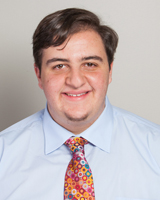 Christopher Deutschman is a graduating senior with a double major in Mechanical Engineering
and German, and an Honors Minor in Interdisciplinary Studies. He spent his sophomore
year in Germany, studying German through the CSU International Program in Tübingen
and taking mechanical engineering classes in German at Ulm University of Applied Sciences
in his second semester. He earned straight As in all his German classes, writing papers
and giving presentations, in German, on topics ranging from Goethe’s Werther to the
European Union. He has worked as a teaching assistant in the Department of Mechanical
Engineering, a research assistant in the SDSU’s microelectromechanical systems lab,
and as a preschool teacher during his time in Germany. Additionally, he has been involved
in many student organizations on campus, including Mortar Board, the Global Aztec
Alliance, the College of Sciences Student Council, and oSTEM at SDSU. Following graduation,
Christopher will pursue a Masters in Chemical Engineering at the University of Waterloo,
in Ontario, Canada.
Christopher Deutschman is a graduating senior with a double major in Mechanical Engineering
and German, and an Honors Minor in Interdisciplinary Studies. He spent his sophomore
year in Germany, studying German through the CSU International Program in Tübingen
and taking mechanical engineering classes in German at Ulm University of Applied Sciences
in his second semester. He earned straight As in all his German classes, writing papers
and giving presentations, in German, on topics ranging from Goethe’s Werther to the
European Union. He has worked as a teaching assistant in the Department of Mechanical
Engineering, a research assistant in the SDSU’s microelectromechanical systems lab,
and as a preschool teacher during his time in Germany. Additionally, he has been involved
in many student organizations on campus, including Mortar Board, the Global Aztec
Alliance, the College of Sciences Student Council, and oSTEM at SDSU. Following graduation,
Christopher will pursue a Masters in Chemical Engineering at the University of Waterloo,
in Ontario, Canada.
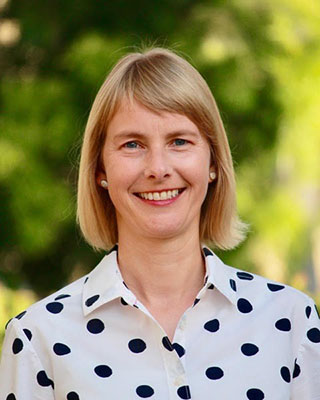 Most Influential Faculty Member
Most Influential Faculty Member
Dr. Kristin Rebien has been my professor for every German course I have taken since my return from my study abroad in Germany, and she has been instrumental in shaping my relationship with the language I’ve learned and the cultural I’ve come to know. Through her classes, I have been able to explore the history and future of Germany, and in parallel to that, the growth of the European Union and supranational bodies all over the world. Not only do I feel monumentally more confident in my German language abilities, I also feel more informed and engaged with Germany and the European Union as they are now. Under her guidance, I have become more active in trying to understand the political and cultural landscapes around me, and I know that I am a better global citizen because of it.
Faculty Bio
Kristin Rebien is an Associate Professor of German and European Studies and the Director of the German Program at SDSU. She holds M.A. degrees in German and Political Science from the University of Leipzig, Germany, and a Ph.D. in German Studies from Stanford. Her research focuses on the interface between literature and politics, philosophy, and the visual arts in the twentieth and twenty-first century German culture. She joined the SDSU faculty in 2006.
 Lisette Kelly, Outstanding Graduating Senior in Comparative International Studies
Lisette Kelly, Outstanding Graduating Senior in Comparative International Studies
I grew up in a small mountain town in Southern California. I come from a big, French Basque family. My culture is very important to me and there is nothing I value more than my family. Being second generation, my appreciation for my culture has sparked an empathy in me for the rest of the world. I love history, political science, and any discipline that enlightens why humanity is the way it is. I am a transfer student from SDCCD and chose SDSU because it had been my dream since I first visited the campus at 16 years old. I hope to be able to use the knowledge I have accrued at SDSU to make the world a better place.
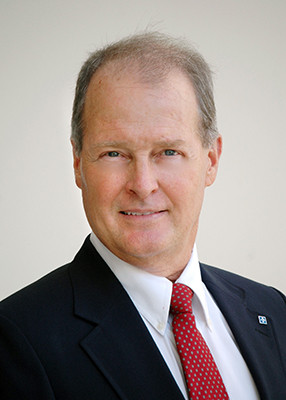 Most Influential Faculty Member
Most Influential Faculty Member
I chose professor Schorr as my most influential faculty member because he made me realize that perfecting and continuing to use my French is one of my main priorities. He is extremely lively in the classroom and makes the material easy to relate to and remember. Above all, he has inspired me to continue my French and worked actively to show me ways to make that happen.
Faculty Bio
James L. Schorr is an Emeritus Professor of French. His research interests include the Enlightenment and a number of 18th century writers, especially the works of Justus van Effen.
This has been a year of exciting upcoming changes for the department. First, we are thrilled to welcome Professor Mathias Schulze, who will be joining the department as the new Director of the Language Acquisition Resource Center (LARC) this summer. Professor Schulze is currently Professor of German and Director of the Waterloo Centre for German Studies at the University of Waterloo, Canada. He is the recipient of a 2001 PhD in Language Engineering from The University of Manchester (UMIST, Manchester, UK) and a 1990 MA in German and Russian from Leipzig, Germany. He is co-author of the scholarly book Errors and Intelligence in Computer-Assisted Language Learning: Parsers and Pedagogues (Routledge, 2007), has edited eight books and special issues of scholarly journals, and published about sixty articles and chapters in edited collections. He has been co-editor of the prestigious CALICO Journal (Computer-Assisted Language Instruction Consortium) since 2011. This is our first hire since 2011. Many thanks go to Associate Professor Kristin Rebien (German and European Studies) for chairing the search committee.
Second, Professor Mary Ann Lyman-Hager (French; Director of the Language Acquisition Resource Center) received the 2017 California Language Teachers’ Association Hal Wingard Lifetime Achievement Award. This prestigious award recognizes an individual’s dedication and commitment to the language teaching profession over an extended period of time. She will be passing the LARC Director baton to Mat Schulze and retiring in August after 20 years at SDSU. She will be back teaching part time in the department starting in Fall 2017.
Third, Associate Professor Clarissa Clò (Italian and European Studies) was promoted to the rank of Professor, effective in August 2017.
Fourth, after seven years of service, Professor Anne Donadey is stepping down as Chair of the Department of European Studies and returning to the faculty full time in August 2017. Professor Clarissa Clò has been selected as the new department Chair. She will provide new vision, creative energy, and innovative ideas for the future of the department.
Other Honors, Awards, and News:
Three faculty members—Professors Clarissa Clò, Anne Donadey, and Emily Schuckman-Matthews—were granted Critical Thinking Grants (one course release each) to focus on their current research and writing projects. The Critical Thinking Grants are funded through the generosity of philanthropic donors to the College of Arts and Letters. They contribute to supporting faculty research and teaching excellence.
Two faculty members—Professors Anne Donadey and Kristin Rebien—were awarded Assigned Time for Exceptional Service to Students (one course release each). These are competitive awards and our department received half of the four awards granted in the College of Arts and Letters this year. These awards were instituted three years ago as part of the faculty union contract to acknowledge service work done by faculty above and beyond the call of duty. The hard work and commitment of our faculty is evidenced by the fact that our department has yielded four of the fourteen awards (29%) granted over the past three years.
Professor Anne Donadey (French and Women’s Studies) will be on sabbatical leave in Fall 2017 to work on her book manuscript, tentatively titled Hiccups of Memory: The Algerian War in Film Fifty Years Later, 2004-2012. Sabbaticals are granted through a competitive process at SDSU.
Alumnus Erik Homenick (French M.A. graduate, December 2015) was accepted into the PhD program in Literature at UCSD and will start his studies in the fall.
Last but not least, Outstanding Graduating Senior Anna Shipulina (Russian major, European Studies minor) selected Professor Veronica Shapovalov (Russian and European Studies) as her Most Influential Faculty member.
Publications:
Professor Edith Benkov (French and European Studies) published a chapter, “Gender and the Prosecution of Heresy in the French Courts” in the edited book collection Representing Heresy in Renaissance France in 2017.
Associate Professor Clarissa Clò (Italian and European Studies) published three essays. In 2016, her co-authored article, “Regarding the Pain of Others: Migrant Self-Narration, Participatory Filmmaking, and Academic Collaborations” appeared in the California Italian Studies journal and her chapter, “Presente tra-passato, futuro e continenti: transmedia storytelling e gli archivi postcoloniali possibili” was published in the edited book Presente Imperfetto: Eredità coloniali e immaginari razziali contemporanei. Another chapter, “Transmedia Collective Storytelling from below: Timira and the New Italian Epic” appeared in the edited book collection Encounters with the Real in Contemporary Italian Literature and Cinema in 2017.
Professor Anne Donadey (French and Women’s Studies) edited the volume Approaches to Teaching the Works of Assia Djebar, published by the Modern Language Association in their Approaches to Teaching World Literature Series in 2017. She also co-edited an anthology with three SDSU colleagues, Professors Bonnie Kime Scott, Susan Cayleff, and Irene Lara. Women in Culture: An Intersectional Anthology for Gender and Women’s Studies, Second Edition was published by Wiley Blackwell in 2017.
In 2017, Dr. François Vanleene (LARC) and Professor Mary Ann Lyman-Hager (French and European Studies and LARC Director) and published version 2.0 of an interactive textbook produced and distributed by the Language Acquisition Resource Center, La Civilisation française: Cours en ligne en 20 chapitres.
Associate Professor Kristin Rebien (German and European Studies) published an article, “Whose Nation? Political Johannes Bobrowski’s Case for Inclusive Communities and Basic Liberal Rights” in the German Studies Review in 2017.
Professor Veronica Shapovalov (Russian and European Studies) published a conference presentation, “Motherhood in the GULAG: Mother, Mom, Mommy” in Motherhood and Fatherhood through the Prism of Time and Cultures. Proceedings of the IX International Conference of the Russian Association for Research in Women’s History (RARWH) in Russia in 2016.
Dr. Daria Shembel (Russian) published an article, “Born in the USSR: Children vs. Ideology and the Impact of Database Cinema” in Slovo: An Inter-Disciplinary Journal of Russian, East-Central European and Eurasian Affairs in 2016.
Thanks to all of you for your hard work and congratulations on your awards and achievements!

